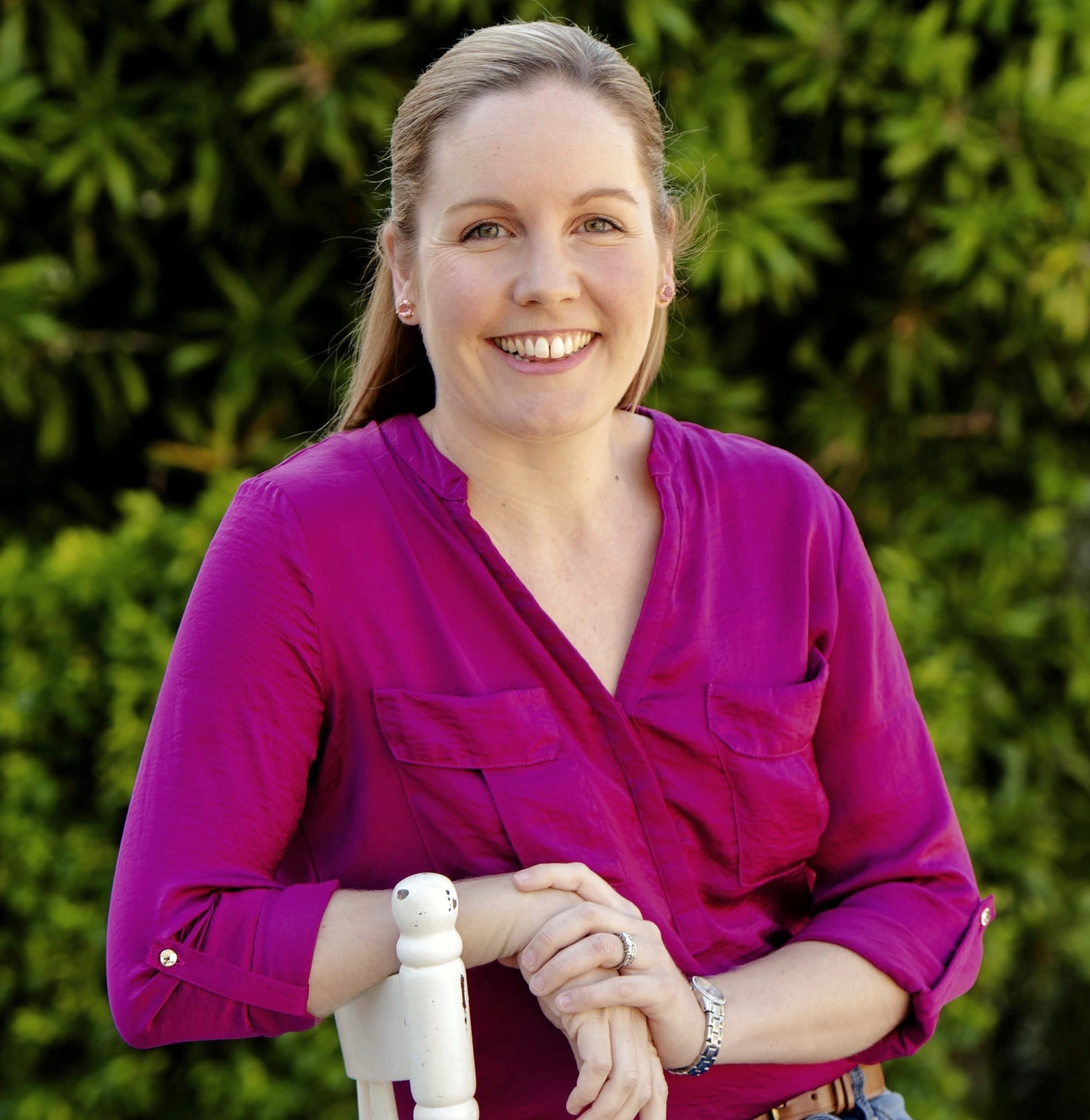
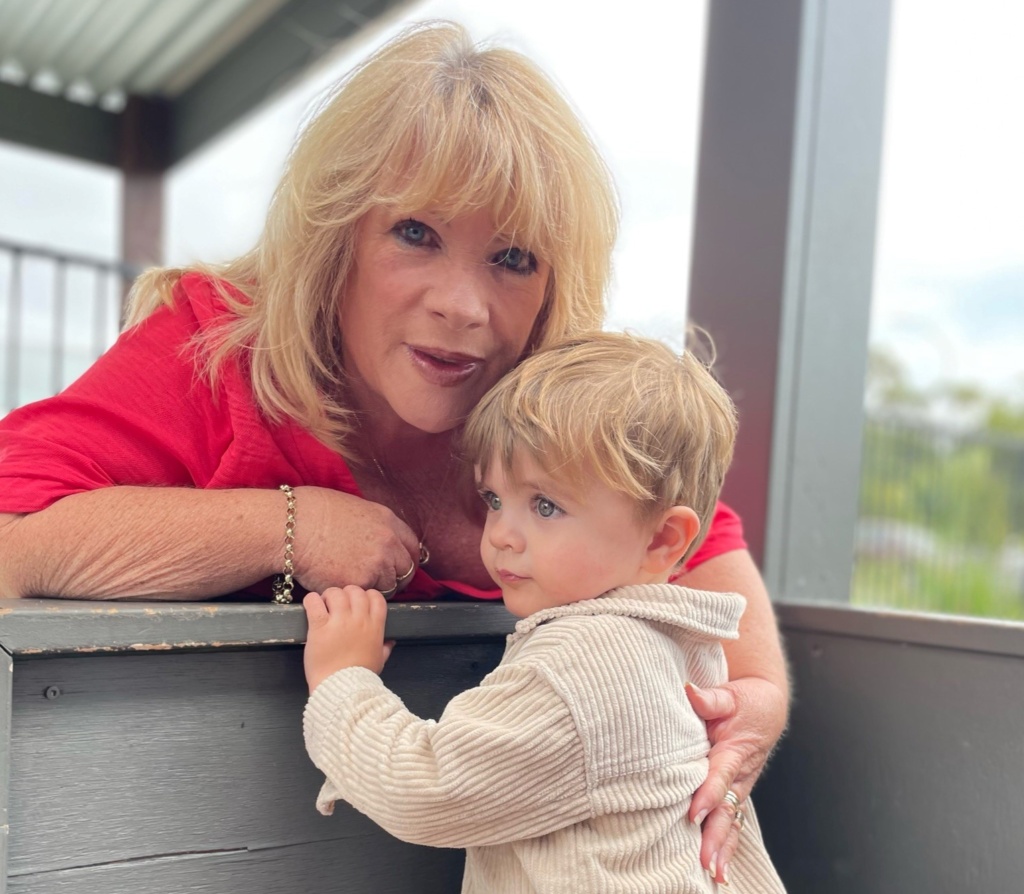
Grandparents have always shared a special bond with their grandchildren, but nowadays they are also playing an increasingly important role as a caregiver, as children spend much more time with their grandparents than ever before. Sometimes however, the generation gap can make it hard to think of new and fun things to do together that appeal to everyone.
Whether the grandchildren are spending an afternoon, a weekend, or the school holidays with you, this list is sure to keep children and grandparents of all interests and physical abilities, entertained and making memories year-round.
A beautiful day on the Gold Coast’s waterways make for some stunning views and great sight-seeing! The Gold Coast’s very own hop-on hop-off ferry is the perfect multi-generational way to spend a day. Departing hourly from five iconic Gold Coast destinations, including the famous Surfers Paradise and HOTA, Home of the Arts, you can hop on at any of the five stops, and stay aboard for the full loop (two hours) or explore the hop-off destinations at your leisure. Enjoy a drink from the onboard bar whilst the friendly captain keeps you entertained with informative commentary, music, local tips and wildlife spotting. Children can also meet the captain and have a turn driving the boat. There are a range of ticket options available, from day passes to long hops and short hops – depending on your budget and timeframes. Children under five always travel for free too!
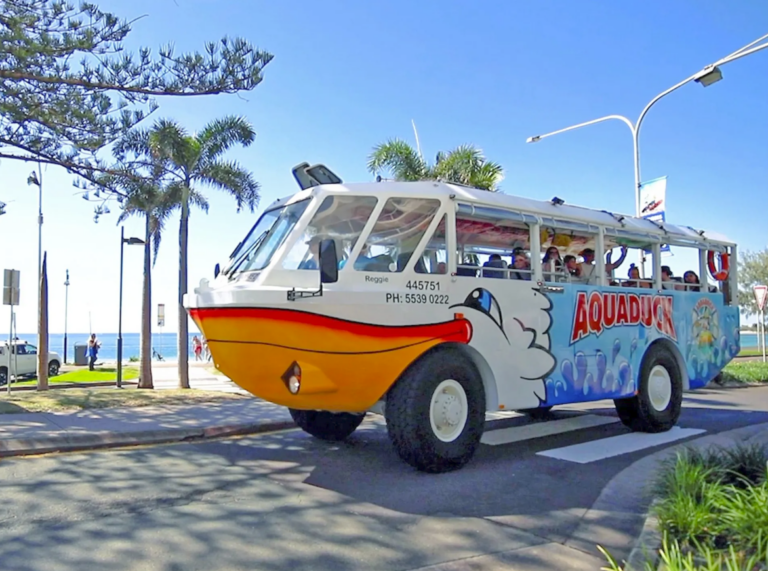
Another way to take to the water is with the iconic AquaDuck, and while it’s touristy, it’s a really great family outing, and perfect for multigenerational passengers. Embarking in the heart of Surfers Paradise, drive down the Esplanade overlooking the beautiful beaches and head towards The Spit. Once you reach the boat ramp just past SeaWorld, the tour changes pace and you’re heading for the water! Watch as the amphibious ‘duck’ changes from bus to boat and gently glides into the water. Now you’ll head through the Broadwater to check out how the millionaires live. You’ll finally return to land and drive down Tedder Avenue, before finishing back up at Cavill Avenue. The tour takes about an hour and is very family friendly, with children offered the chance to drive the boat and get their Captain’s certificate!
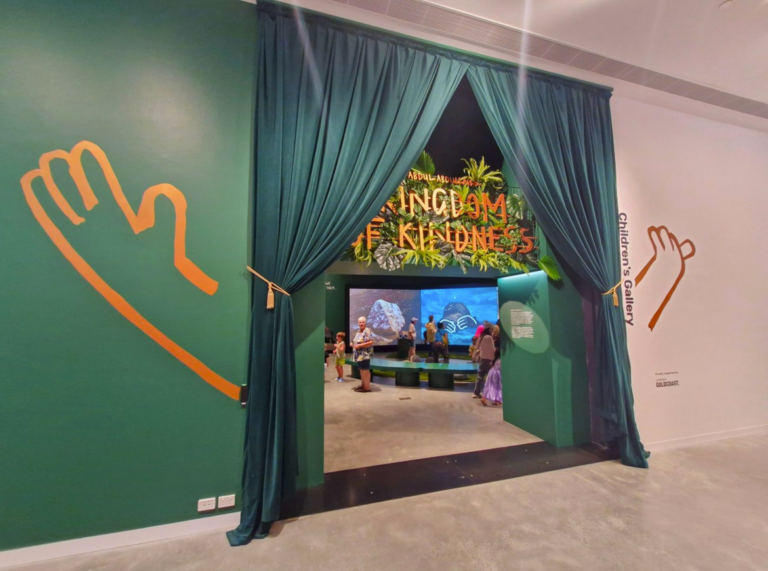
While the HOTA Gallery may be designed to cater for international art exhibitions, grandparents looking to give the grandchildren some culture will feel right at home! The Children’s Gallery at HOTA Gallery lets little artists get hands on – you won’t find any “do not touch” signs here! The Children’s Gallery changes every few months, each time offering a variety of interactive exhibits that complement the main galleries. After visiting the Children’s Gallery, take a stroll through the other free Galleries where you’ll find a few installations that are interactive and the children will love. Be sure to also ride the lift to the top floor and take in the Gold Coast skyline view! Fabulous 270 degree views await and there’s a guide you can use to work out what all the buildings are.
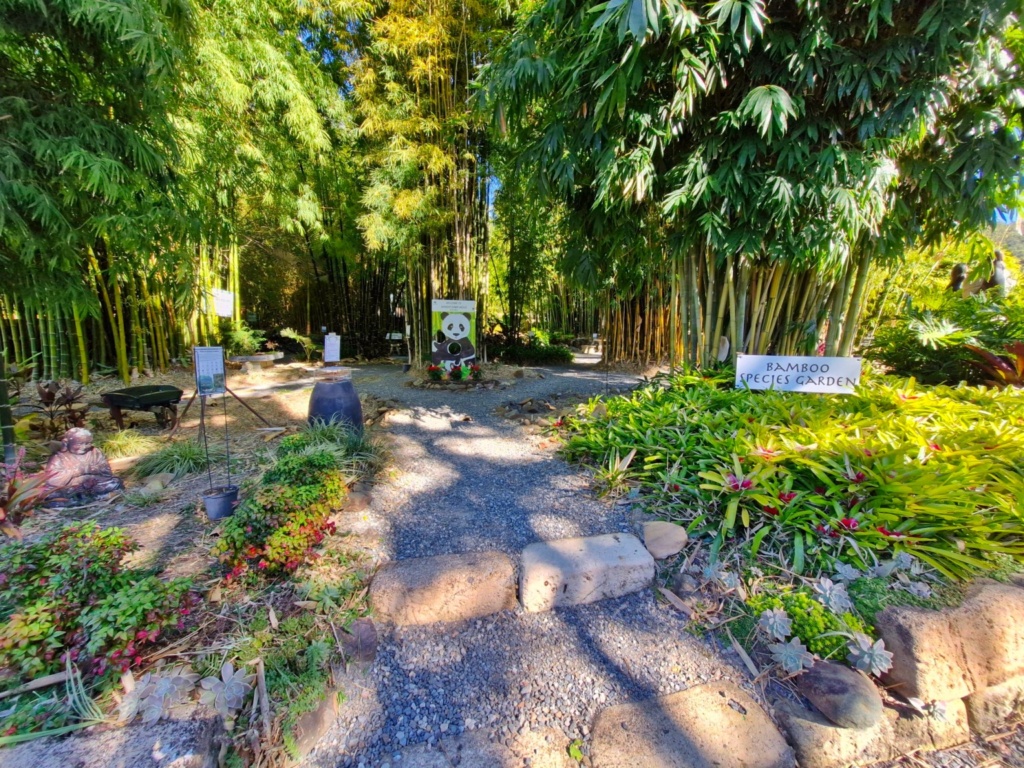
Bamboo Down Under at Wongawallan is a garden centre with a difference. The perfect grandparent’s day out, here you can explore a species garden, meditation garden, labyrinth, sensory garden and bamboo tunnel, and get bamboozled in the bamboo maze! Children can take on the Scavenger Hunt to discover the hidden pandas, all the while having a look at some incredible ornamental species of bamboo. Don’t miss the Rainforest Walk, a very peaceful stroll through a forest of enormous bamboo varieties. Dotted throughout are information signs about bamboo, little panda ornaments and other garden statues. Don’t miss the enchanted hollow at the end of the Tunnel.
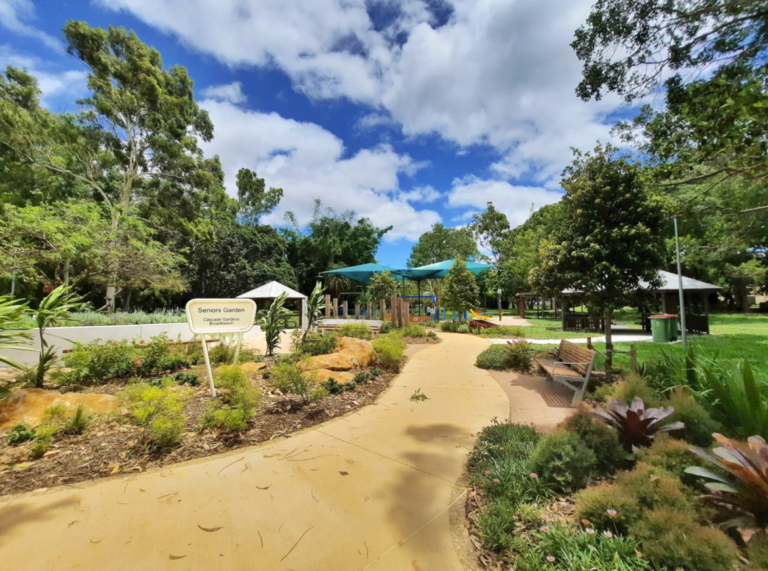
The Cascade Gardens at Broadbeach has a special addition of a sensory garden designed for seniors, but it also makes for great fun for little ones! In the sensory garden you’ll find elements including a musical gong, wayfinding design and productive gardens that encourage you to interact with the gardens through sight, touch and smell. It’s a beautiful addition to the Gardens and makes this spot perfect for multi-generational get togethers! The playground is older in style, but the children don’t seem to mind. You’ll find a flying fox, rope bridge, rock climbing wall and a carousel.
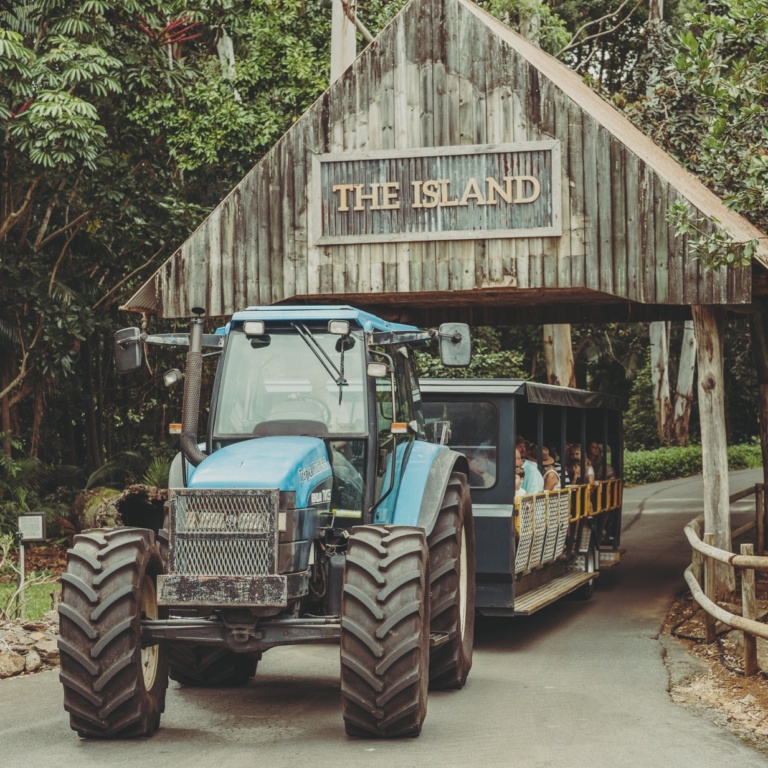
For the more active grandparents, a visit to Tropical Fruit World just over the NSW border in Duranbah is a fabulous day out for the family! Book a Farm Tour and experience a fruit tasting and a tractor-driven guided park tour. On the tour you can pick and eat bananas straight from the tree, crack macadamia nuts, feed and pat kangaroos, sheep, alpacas and miniature horses, and enjoy a short wildlife boat cruise too! At the end of the tour visit Wildlife Island and burn some energy on the flying fox, mini golf course and volleyball court. Then, check out the fruit market, café, and the huge sandpit by the grassed lawn to relax. If you live in the Tweed, Gold Coast, Byron, Lismore and Ballina, you can purchase tours at a discounted rate.
(Image with thanks to Tropical Fruit World)
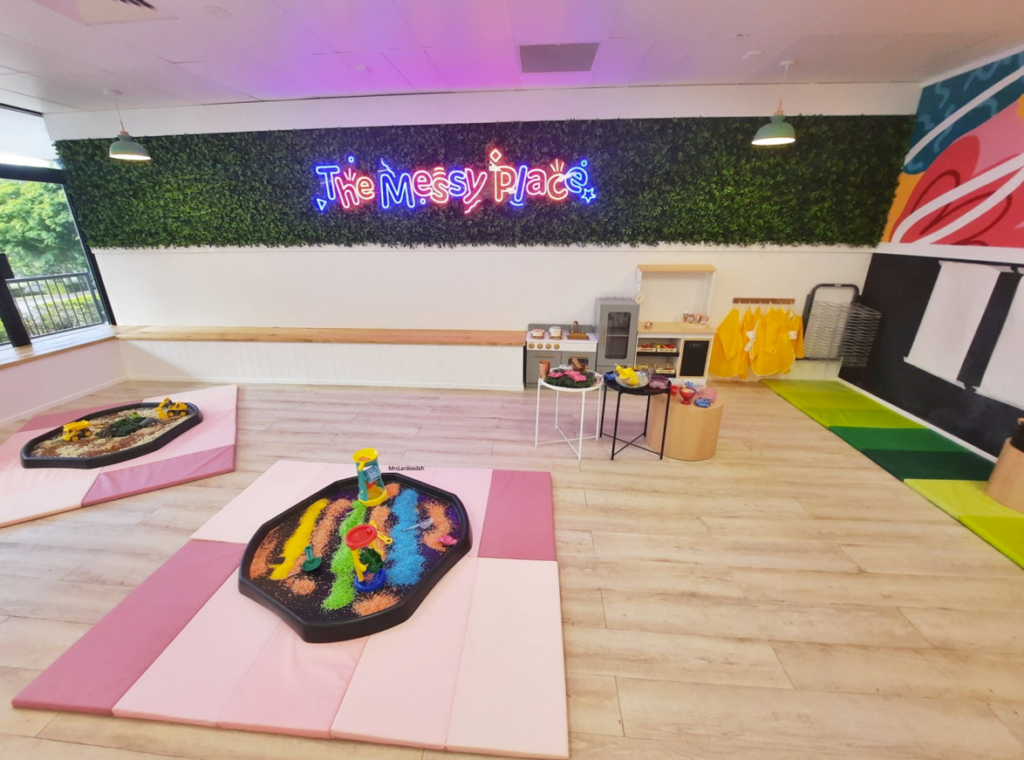
The generational gap can sometimes be hardest when the grandparents are tasked with spending time with energetic little toddlers. Keeping up with their ever-changing attention span, endless energy and natural curiosity is challenging for everyone! The Messy Place at Ashmore is the ultimate creative sensory play centre on the Gold Coast, designed exclusively for children under six years of age. They offer creative and messy play sessions in a safe and enjoyable environment, where they can unleash their imagination and make a mess. Exploration is encouraged, and grandparents can feel reassured being indoors in a secure, enclosed space. Sessions are booked on a casual basis and run five days per week.
National Grandparents’ Day is celebrated in Australia on the last Sunday of October. But as we all know, Grandparents Day is any day that the grandchildren can spend precious time with their grandparents. Whether you are a parent looking for how your child can have fun with grandma and grandpa or a grandparent seeking things to do with your grandchildren, we hope these ideas will inspire your time together.
We wholeheartedly believe in the proverb ‘it takes a village to raise a child.’ Little Scholars is proud to be a part of communities across South East Queensland, and we’re happy to play a small role in childhoods across the Gold Coast, Redlands and Brisbane.
We offer you and your child the very best facilities, resources and early educational, play-based programs available, which are underpinned by the early years learning framework. Our belief is that through quality education and care for children we can also encourage, assist and support the entire family.
Our dedicated team of educators are committed to the individual needs and interests of children and their families, and thus we encourage and welcome family input and involvement.
We aim to be like an extension of your family and are very relationship-driven. We support nurturing relationships between our educators and your child, the relationships your child has with the other children who attend, and we value our relationship with you as the parent and other family members. So book a tour today to get started!
Find Lara’s recommendations at her website Mrs. Lardeedah.com, and follow her socials Facebook and Instagram
Deception Bay is a vibrant community in the City of Moreton Bay, just 45 minutes from Brisbane. Little Scholars has proudly been a part of this community since 2018. As we gear up to open our second campus, Little Scholars Deception Bay North, in January 2025, we’re excited to share some of our favourite family-friendly activities in the Moreton Bay area. After all, we’d like to think we’re more than just early learning, we’re proud members of this vibrant community. We cherish our families and believe in building treasured memories throughout childhood.
Check out our list of 17 fun family activities, though it’s just a glimpse of what this lively community has to offer.
Images and information courtesy of the organisations mentioned below, as well as City of Moreton Bay, Visit Moreton Bay and Brisbane Kids,
Moreton Bay and surrounding areas host a number of art and culture galleries, a terrific addition to an area of about 500,000 people!
Caboolture Regional Art Gallery – In a contemporary gallery space, visitors can explore an exhibition program featuring significant Australian and international artists. The gallery showcases in-house curated exhibitions alongside touring shows from Australia’s leading visual art institutions, bringing the best of Australian art to the region for everyone to enjoy. Notably, a variety of family-friendly activities, including artist talks, workshops, and tours, are available throughout the year, making it a welcoming space for families to engage with art and creativity together.
Redcliffe Art Gallery – Redcliffe Art Gallery is the Peninsula’s premier family-friendly arts destination! With four exhibition spaces, families can enjoy a diverse range of works by local, emerging, and established Australian artists. The Studio, a dedicated public program space, frequently hosts artist-led workshops and transforms into a vibrant and popular art space for kids and families during school holidays. It’s the perfect place for families to explore art together and spark creativity in a welcoming environment!
Pine Rivers Art Gallery – a welcoming family-friendly space located on Turrbal Country. The gallery features an immersive exhibition program centered around an annual theme, showcasing collaborations with local and national artists. Families can enjoy art experiences that inspire curiosity and creativity together. Visitors of all ages can enhance their experience in the gallery’s dedicated engagement space, which hosts a diverse range of events and activities throughout the year. From hands-on artist-led workshops to fun, family-friendly programs during school holidays, there’s something for everyone to enjoy!
Bribie Island Seaside Museum – Plan your next outing at the picturesque Bribie Island Seaside Museum! Located near the waterfront and overlooking the iconic Pumicestone Passage, this museum showcases the rich and fascinating history of Bribie Island, including: video archives with stories from First Nations elders, a theatre screening films about the famous S.S. Koopa (1911-1953), insights into Bribie Island’s significant role during World War II and the story of internationally acclaimed artist Ian Fairweather. Visitors can learn about the intriguing history of Bribie Island through a variety of immersive and interactive displays, along with heaps of events and workshops throughout the year.
Redcliffe Museum – is a family-friendly destination that offers children a unique and contemporary glimpse into the people, places, and stories that have shaped this historical seaside town. The museum features: a First Nations video archive with stories about language and culture, films about the early days of the Peninsula, including the famous Rollerdome, offers a chance to rummage through memory boxes to uncover items and stories from the past. Throughout the year, families can enjoy a vibrant program of ever-changing exhibitions, events, and workshops, including the exciting Imaginarium, a dedicated children’s play space filled with various activities and crafts designed for children to create, learn, and explore.
Pine Rivers Heritage Museum is a fantastic family-friendly destination that invites children to explore the stories and significance of the district throughout history. The museum features an 1890s kit home produced by the renowned timber merchant James Campbell and Sons, the Skyring Clock Collection, showcasing 50 hand-crafted clocks, short films detailing the history of Normanby Rum, the Australian Paper Mill, and other early industries in the region, and a collection items that highlight Pine Rivers’ role during WWII.
Woodford Museum – Right in the heart of Woodford Village and only about half an hour from our Deception Bay campus is the Woodford Historical Society’s Museum. The Museum is a community exhibition hub for the history of Woodford’s early explorers and home of the Mick and Val Draper collection of miniature buildings.
The Hills District All Abilities Playground – Leslie Patrick Park is an ideal spot for a fun-filled day for all little ones! This all-abilities playground ensures that children of all physical and intellectual abilities can join in the excitement and play together.
Bray Farm “Harry Potter” Park, Griffin – Mentioned in our popular blog post about playgrounds across South East Queensland, Bray Farm Park is commonly known as the ‘Harry Potter’ park in Griffin, north of Brisbane, this destination blends art, culture, nature, and fun for the entire family. There’s two whimsical ‘cottage style’ play structures, a climbing sphere, slides, swings, and charming bridges. With a magical forest backdrop, plenty of park benches, winding paths, and a large grassy area for games, this park is sure to be a fun day out for all! Parents take note, there aren’t toilets, the park isn’t fenced and it’s close to a road, so keep an eye on your youngsters while they play!
Lightwood Parklands in Caboolture South is an impressive multistorey playground designed for older children, making it perfect for primary school age and above. The playground features a challenging multi-storey fort with a thrilling three-story tunnel slide, swings for younger children, climbing nets, and a pump track that connects to wide pathways—ideal for bikes and scooters. Additional amenities include playing fields, a basketball half court, BBQs, and accessible toilets, ensuring a fun and inclusive experience for all.
Brisbane Kids has a fantastic blog on the best parks in Moreton Bay – check it out!
Caboolture Region Environmental Education Centre (CREEC) – With more than 18 hectares of diverse native vegetation near Burpengary Creek, the CREEC has plenty of wide open spaces, as well as shady, tucked away areas for hotter days. Discover the nocturnal room, interactive educational displays, and native stingless beehive inside the centre. Entry is free. With its manicured greens, a large fully fenced, all-abilities playground, BBQs and other family-friendly facilities, a nursery, and forest trails, the iconic CREEC has something for almost everyone!
Trevena Glen Farm at Mount Samson – a great escape from the city, Trevena Glen Farm gives an authentic farm experience for families with a dozen animals on the 16 acre family farm. Families can pay to tour the farm and see horses, rabbits, chickens, guinea pigs, goats, alpacas, llama, pigs, sheep, donkeys, mini horses and a dog. Pony rides are also an option and At the heart of the farm is Trevena Glen’s iconic 130 year old Moreton bay fig tree. This beautiful tree has a multi-level tree house.
Dolphin Wild Island Cruises Moreton Island – For the adventurous types, why not try a Moreton Island cruise and snorkel experience? Enjoy an eco-cruise around the area spotting marine life including dolphins, sea turtles and dugongs feeding on the seagrass during a marine eco-tour. The company welcomes families to bring their prams on board, ensuring that parents and guardians can easily navigate the vessel with their little ones. The minimum age to participate in the snorkelling activity is six years with an ability to swim and all children must be accompanied by an adult. Lucy, the operations manager, says they do the guided snorkel tour in rotations of smaller groups so both carers can have an opportunity to snorkel if looking after children who can’t participate. Those who can’t participate in the snorkel tour can either remain on the boat or get ferried to Moreton Island beach to experience the sand dunes and shallower waters.
Osprey House Environmental Centre – The interpretive centre includes a life size dugong, bird and animal displays and the live streaming video from the osprey nest. You’ll find interesting educational displays, ‘touch’ tables and information provided in numerous and novel ways. They also offer story time sessions and school holiday programs. Explore the mangroves, Wildlife can be seen from the Mudflats, and in the Eucalypt Forest, the dominant trees above the tidal zone are Queensland Blue Gums and Grey Ironbarks – major Koala food species. Look out for the Koala that sometimes visits.
Kumbartcho Sanctuary and Nursery –This beautiful 6-hectare sanctuary, located next to the South Pine River, preserves the remaining pockets of riverine rainforest. Kumbartcho is home to an array of wildlife, including koalas, frogs, snakes, turtles, and possums. The nearby river provides opportunities to spot waterbirds, shorebirds, and even predatory raptors. Visitors are welcome to explore the sanctuary, enjoy the playground, and visit the plant nursery for a wonderful day surrounded by nature.
Settlement Cove Lagoon is a picturesque, tropical-style public pool situated on the Redcliffe Peninsula. With palms and fig trees lining the area, the lagoon and wading pools provide a perfect spot for families to relax and enjoy during the summer months. Young children will love the fenced-off water park with mushroom fountains, and a nearby playground. Settlement Cove is a great picnic spot, with barbeque areas, picnic shelters, and plenty of shade.
The Convict Trail – To learn a quirkier lesson, why not take the family along the convict trail? In 1824, Queensland’s first penal colony was founded on the Redcliffe Peninsula, marking the start of the state’s colonial history. The settlement included soldier barracks, a jail, the Commandant’s House, and various smaller buildings. Despite early progress, food and water shortages forced the abandonment of the site, leading to the relocation of the colony to the banks of the Brisbane River, now the heart of Brisbane’s CBD. Today, you can explore this fascinating chapter of history along the 1.7km Redcliffe Convict Trail, where the legacy of Queensland’s earliest settlers comes to life.
There you have it! We hope you enjoyed our list of the best things to do with your family in Moreton Bay. If you’re after the best childcare in Deception Bay, look no further than Little Scholars Deception Bay and Deception Bay North, due to open January 2025!
Contact us or book a tour today to ensure your little one gets the best start to life that they can.
Do you have a family friendly Ipswich place to visit that should be on this list? Let us know on our socials @littlescholarsearlylearning!
*Images courtesy of facilities listed as well as City of Moreton Bay, Visit Moreton Bay Region, and Brisbanekids.com.
The children, educators, staff and families are celebrating Little Scholars George Street receiving an Exceeding result in the National Quality Standards (NQS) Assessment and Rating recently.
Situated in the heart of Brisbane’s bustling central business district, Little Scholars George Street provides exceptional early learning and care for 108 children. Its unique location places children just steps away from some of Brisbane’s most iconic cultural spaces, including the Queensland State Library, Brisbane Square Library, Queensland Museum, and the Gallery of Modern Art.
Excursions like these, which pique children’s curiosity and understanding of the world, are just some of the unique offerings from Little Scholars George Street.
As Little Scholars approaches its 10th anniversary of serving South East Queensland families, the children, and the educators, are the heart of what makes this exceeding campus so special.
“Our team is incredibly dedicated to providing the best early education experience for our little scholars,” says Jae Fraser, founder of Little Scholars. “The Exceeding rating is a testament to their hard work, innovation, and commitment to the children’s development. They consistently go above and beyond to create a nurturing environment where each child can thrive, while also supporting families by making Little Scholars a true home away from home.”
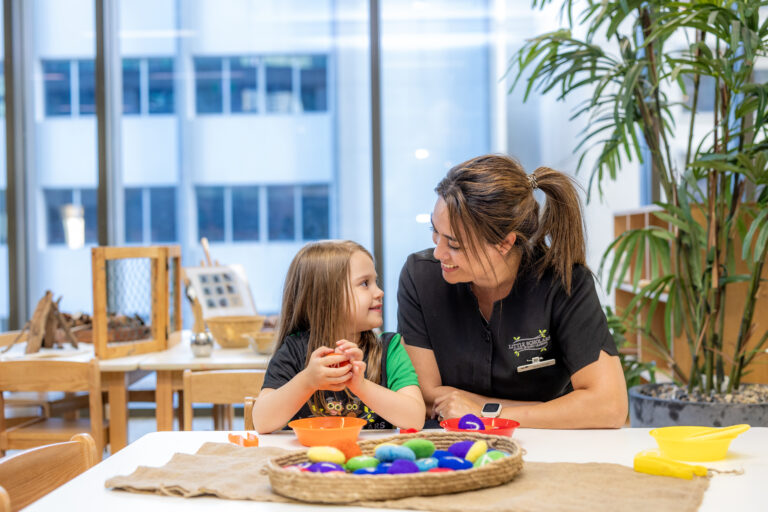
Little Scholars’ Collective Curriculum emphasises how much of its educational experiences are child led, and this was noted in George Street’s assessment.
“Educators and service leaders actively sought the perspectives, opinions, and voices of children, families, and the community,” the assessment noted.
The assessment went on to say the George Street team demonstrated a strong, ongoing commitment to meaningful, authentic, and regular engagement to inform the program.
It highlighted the collaboration Little Scholars has with families and the community supported educators in designing and implementing programs that promoted belonging, valued each person’s unique contribution, and created a sense of wellbeing and calm throughout the service.
George Street team demonstrated a strong, ongoing commitment to meaningful, authentic, and regular engagement to inform the program.
An example of this approach is the Children’s Council, a key initiative at all Little Scholars campuses, including George Street. The Council, composed of children, their early childhood teacher, and educational leader, meets monthly to gather feedback on the children’s kindergarten experience and empower them to participate in decisions affecting their campus. The child-led meetings occasionally veer off-topic, but they offer invaluable insights into the children’s interests and perspectives.
Understanding how busy its families are, Little Scholars George Street goes the extra mile to ease parents’ daily challenges. The campus offers free parking, rare in the heart of Brisbane, along with a valet service where a caring staff member greets children and escorts them to the campus.
Additional support offered to families includes a daily breakfast bar, take-away meals to simplify dinner time, and quarterly date nights, giving parents the opportunity to reconnect while their children enjoy an evening of fun with friends.
“Given our proximity to government departments, law firms, and entertainment venues, we know our parents have demanding schedules,” Jae explains. “That’s why we’re committed to providing these additional services that truly make a difference in their daily lives.”
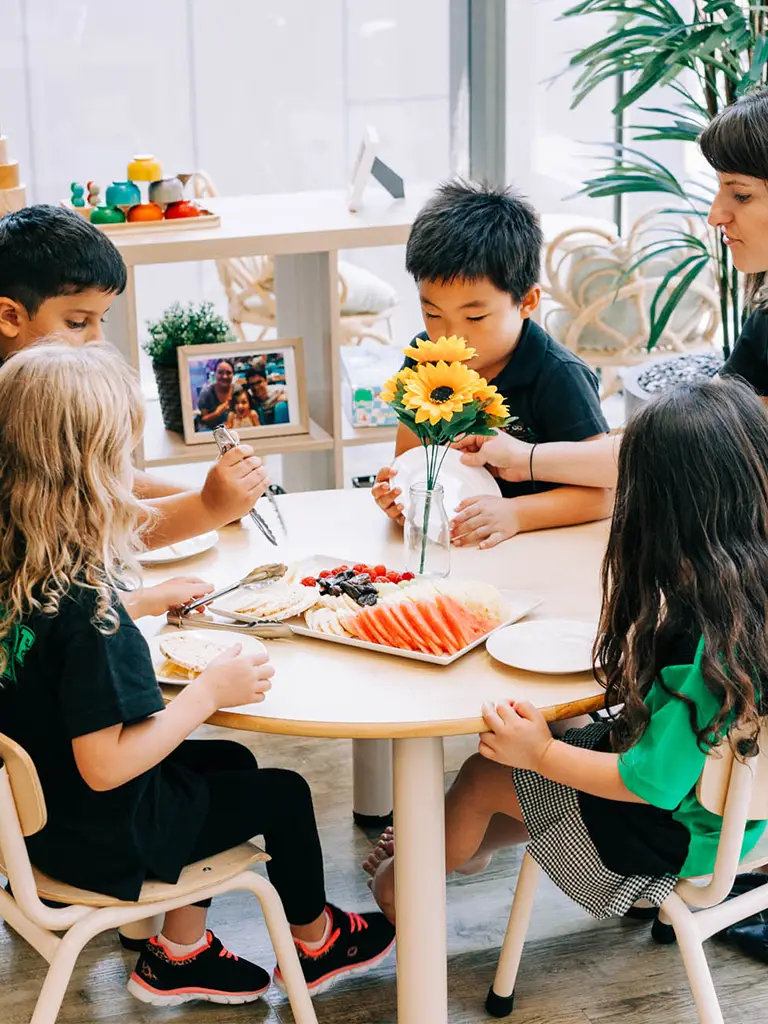
Amy Robertson, campus manager of Little Scholars George Street can barely contain her excitement, and says she’s proud of her staff, who she believes always goes above and beyond.
“Our recent assessment and rating at George Street has highlighted the exceptional quality of care and education our campus provides. We are proud to receive an exceeding rating, a testament to the dedication and professionalism of our educators,” says Amy.
“This achievement has been warmly received by our families, with one parent expressing, ‘We always knew the campus was exceeding, it’s gratifying to see the staff receive this well-deserved recognition from the Department,’” she adds.
Little Scholars George Street’s Exceeding rating reflects the hard work and dedication of its entire community, and it highlights the exceptional quality of early education and care provided at this remarkable campus.

While many Gold Coasters head to the southern suburbs on the weekend, the northern suburbs should not be overlooked for family-friendly weekend adventures! Starting in Stapylton and reaching to Pimpama, the most northerly suburbs of the Gold Coast also include Yatala, Alberton, Steiglitz, Gilberton, Norwell, Ormeau and Jacobs Well. Here you will find unique family activities, a range of family-friendly dining options, and some of the Gold Coast’s most unique play spaces. Here is your guide to getting the most out of a day in the Northern most parts of the Gold Coast.
South-east Queensland’s last original open-air Drive-In Cinema is located in Yatala, and boasts three massive screens accommodating up to 700 cars each night. Bring your camp chairs and sit out the back of your car to watch a movie, or bundle up the blankets, pillows and sleeping bags to make yourself comfortable in the back of your van, ute or car. Perfect for wriggly children, the privacy of sitting in your own vehicle means there is no need to worry if their bouncing around is bothering other cinema patrons. Movies screen every night of the week and they often host special event screenings too.
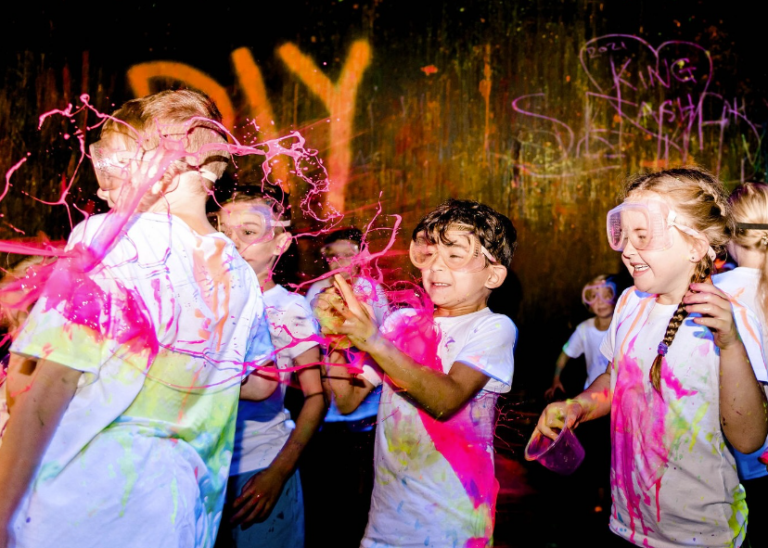
If your family is feeling creative, or looking to get messy, a workshop at DIY Invasion is sure to tick the box. Located at Staplyton, DIY Invasion run craft workshops ranging from resin art to painting, macrame and slime making – with their School Holiday Workshops always extremely popular for children. Another unique feature is their Splatter and Splash Room, which families can book for a private experience! Choose your own dance music, while letting your creativity run wild as you fling, flick, and splash paint around the room and over your fellow participants! This is a great space to unwind and tap into creativity.
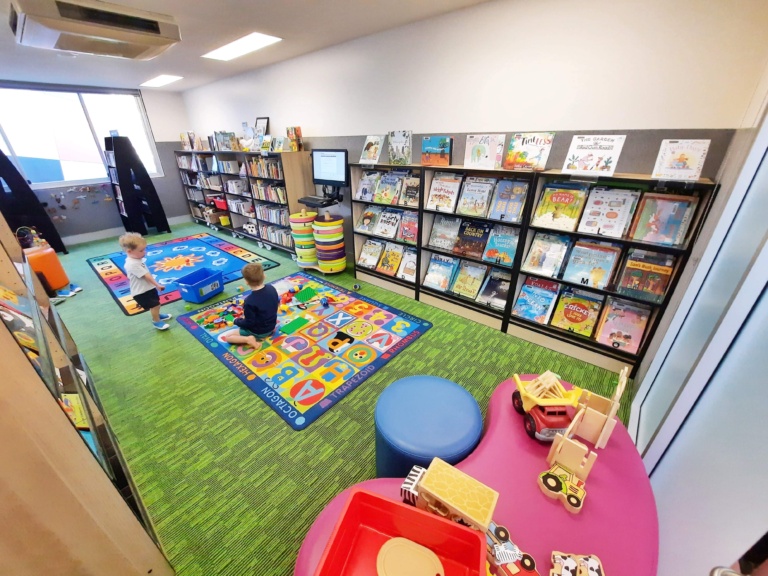
The only library located in the far northern suburbs, the Ormeau Community Lounge & Library is a hidden gem. Here you can visit the Gold Coast’s only Book Box corner, an early year’s library and play-based learning space delivered in partnership with Queensland State Library’s First 5 Forever program. Here children do not have to worry about being quiet, and they are actively encouraged to play with the many games and play resources available. Open six days a week, families can join in Story Time on Friday and Saturday mornings, or participate in Baby Rhyme Time and Toddler Time sessions during the week.
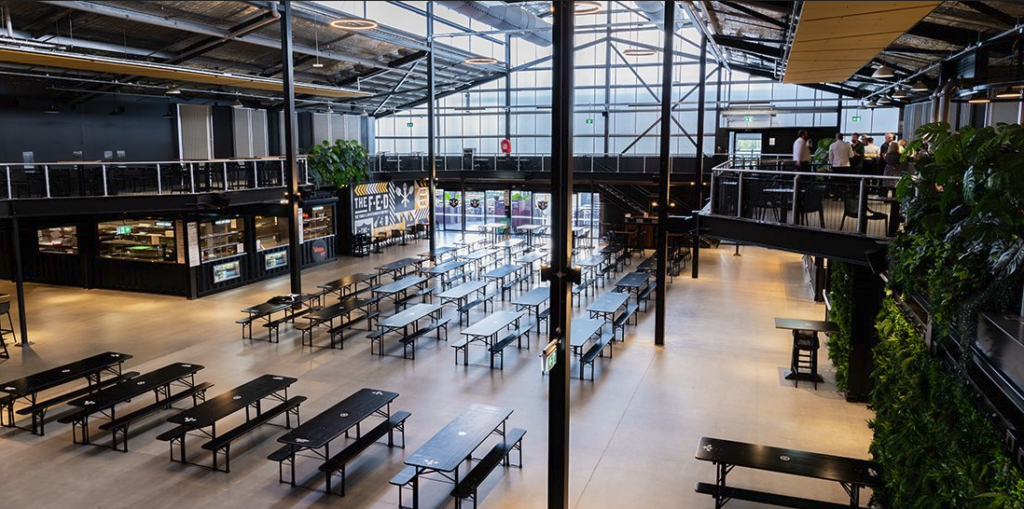
Distillery Road Market is a fresh and exciting new venue located in Eagleby, home to The F.E.D, a 2000-person food and entertainment space. Here you’ll find an expansive indoor/outdoor dining area, with a range of on-site eateries to choose from. Open Thursday – Sunday, the venue is family friendly with live music each evening and long beerhall-style tables to choose from. The best part is that diners can choose meals from six different food outlets, meaning that all tastes and dietary requirements can be catered for! The casual vibe of this venue is perfect for an early dinner with the family, where children and parents can relax, move around, dance and enjoy a great meal together.
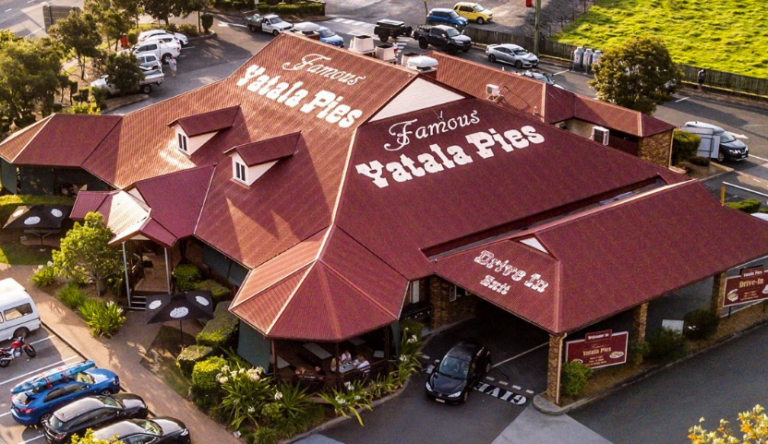
Yatala Pies has been a landmark in the Yatala area for more than 130 years, these days selling around 3,500 pies daily! Well known as a halfway stop on the journey between Brisbane and the Gold Coast, northern Gold Coast locals are lucky to have this icon right here in their backyard. Selling some of the best pies on the Gold Coast, the quality is exceptional and the range delicious. Choose from dine in or takeaway, you can grab a hot, ready-to-eat snack pie, or take-home, oven-ready family pies and snack pie packs. With something for everyone, the family will love a stop in at Yatala Pies any time of the day.
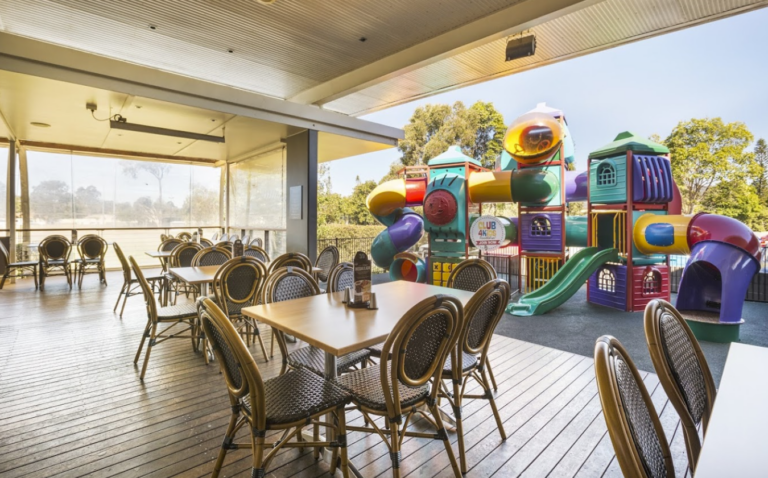
The Norfolk Tavern has got to be the most family-friendly dining option in the northern Gold Coast. Indoors you will find a bright and spacious dining room, while outside there is a wraparound veranda with ample space for dining, opening on to a huge children’s playground. The award-winning Bistro has menu options to suit every taste, from fresh seafood to steaks, pastas, salads and all the traditional pub fare. Extremely popular on weekends, be sure to book a spot on the deck if you are dining with children for easy line of sight from your table to the playground.
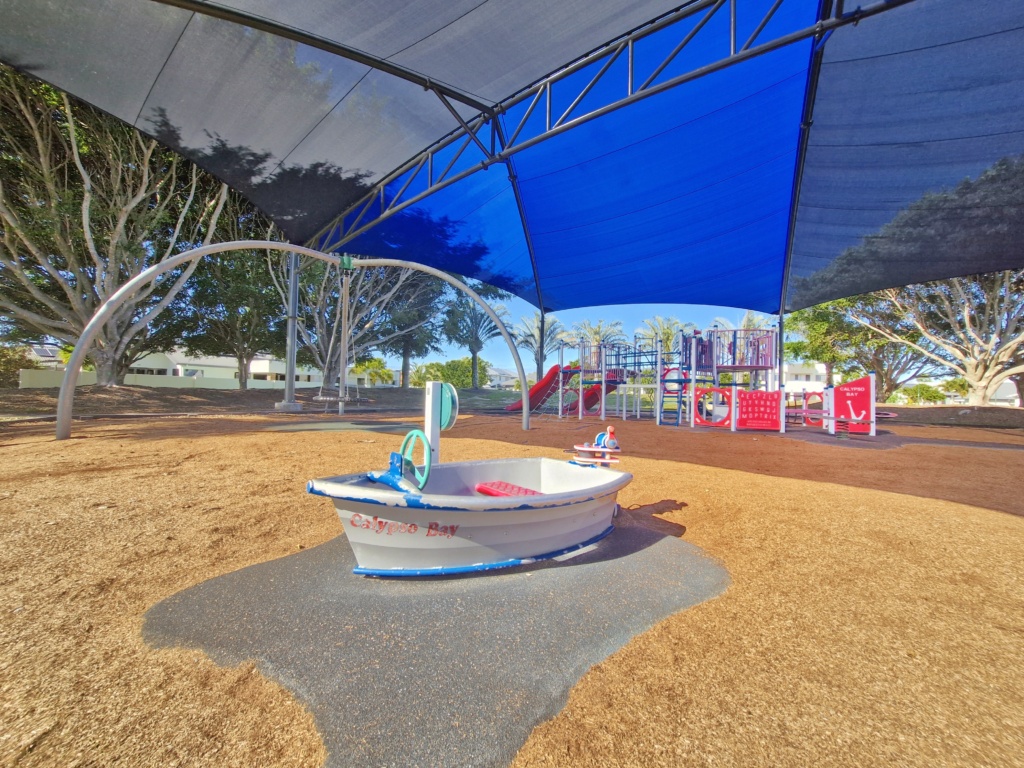
A nautical themed playground appropriate for its position by the water and close by the Calypso Bay Marina, here you’ll find a pirate ship brimming with bridges, wheels, slides and nets – be careful, you might even be asked to walk the plank! Underneath the pirate ship the imaginative play space is further extended, with a small shop counter set up, tunnel frames and other interactive game panels. The swing set with all abilities swing is always popular, as is the spinners and hammock swing. There’s also a little boat for children to pretend to fish or start the engine!
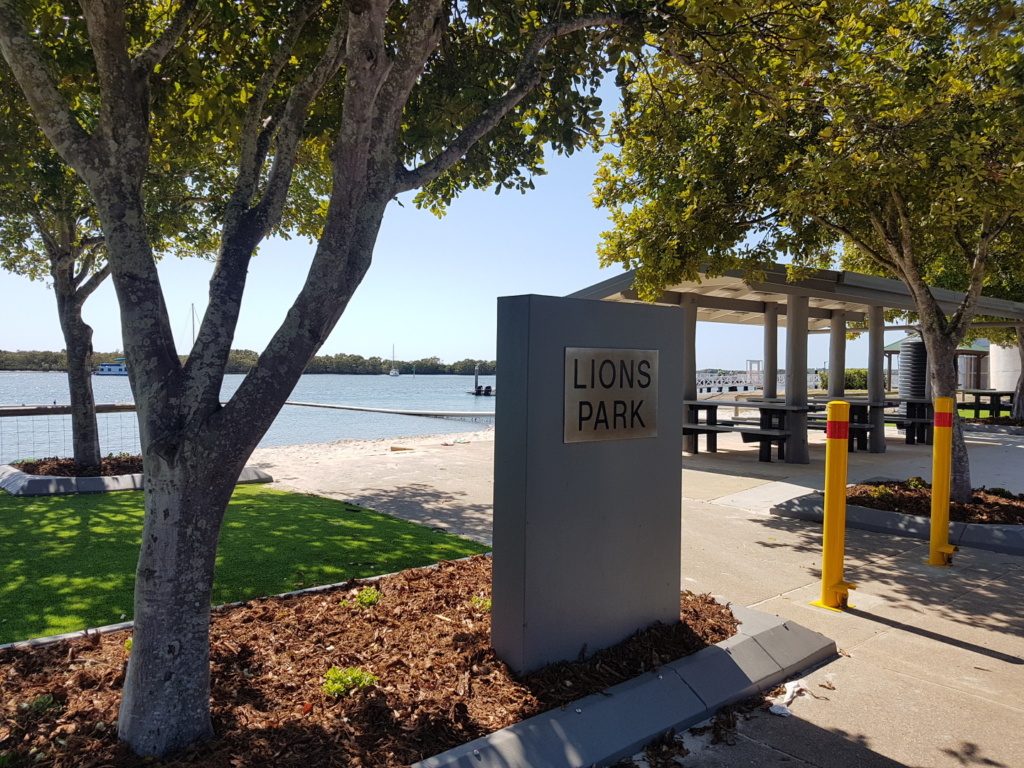
While many think the most northern beach area for children to swim is at Paradise Point, there is a lesser-known spot at the very northern edge of the Gold Coast – Lions Park at Jacobs Well. With easy access from the carpark, you are at a small, shaded beach in just a few steps. The swimming enclosure here has a small sandy beach, a large shade sail over the sand, and few waves, making it ideal for toddlers and younger children gaining confidence in the ocean. Parents will love the ability to sit on a blanket under the shade and still be close enough to their children in the water.
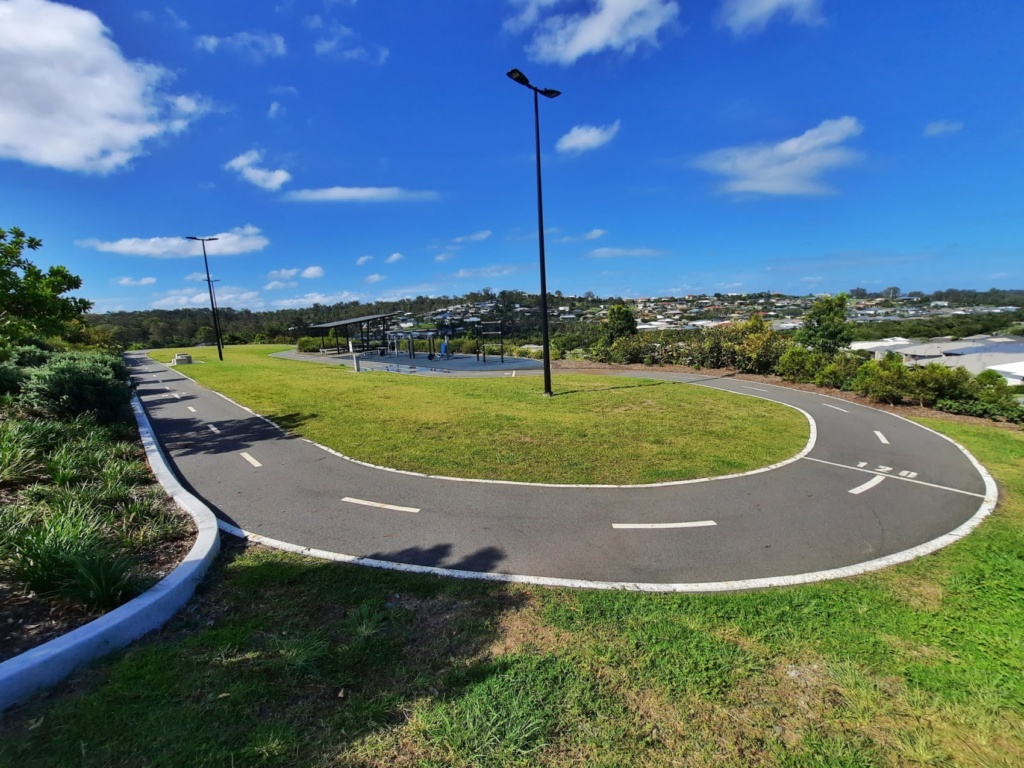
While the playground at Outlook Park, Ormeau may be tiny, pack the bicycles and prepare yourselves for the surprise bike tracks that make this a fabulous spot to visit! Set on a steep slope, Outlook Park is laid out over three levels. At the top you’ll find a small playground best suited for toddlers, and then on the middle and lower level there are two bike tracks, perfect for racing on. While the playground is very small, the bike tracks are great for bicycles, skateboards or scooters, and children will love lining up at the start line and racing the loops to the finish. Celebrate with some pretend play medal ceremonies on the dais at the track!
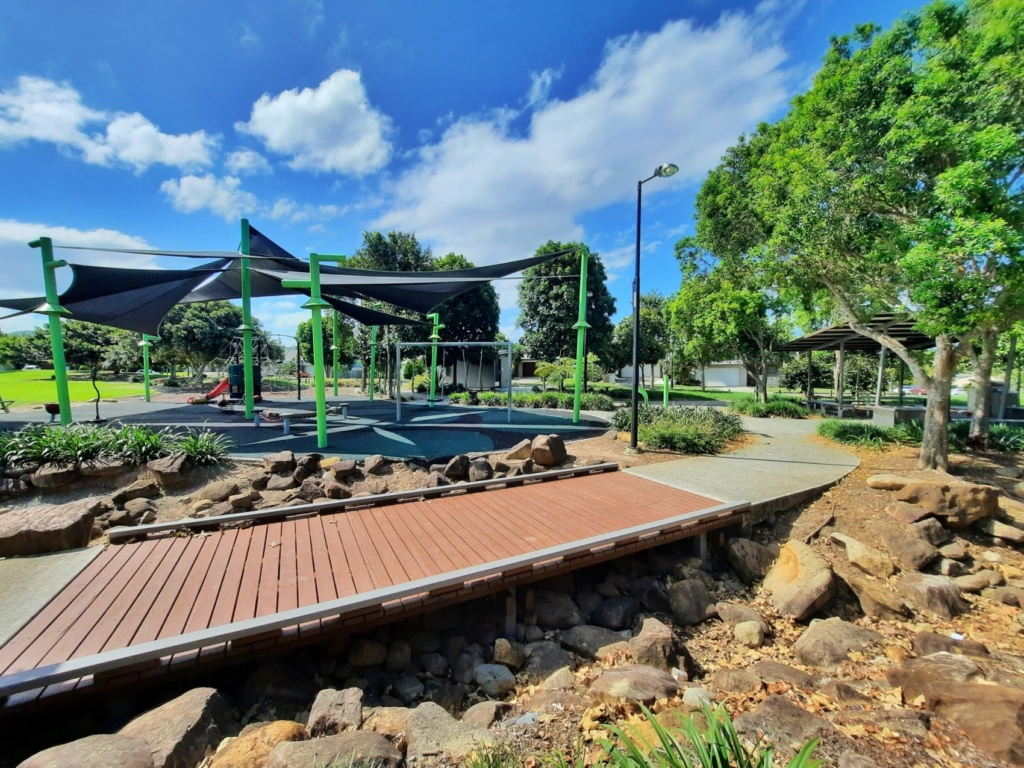
Hilltop Park in Ormeau is an older park, but still delivers a great time. Split into two sections, toddlers will love the smaller, shady play area with a car, climbing frame and mini playground with slide and swing. The main playground space is better suited for children over five, with a larger playground and slide, large climbing net, balance beams, spinners and swings. Children can also climb the ramp up to the old water tower, which has been converted into a play structure.
The northern Gold Coast offers a variety of unique and exciting activities for the whole family. From classic drive-in movies to hands-on creative workshops, scenic playgrounds, and delicious dining options, these suburbs have something for everyone. Whether you’re looking for a relaxing day by the water or a more adventurous outing, there’s no shortage of fun to be had. Next time you’re planning a family day out, consider exploring the hidden gems of Stapylton, Ormeau, Yatala, and beyond—you might just discover your new favourite weekend spot!
Little Scholars provides quality early education and care for children across South East Queensland, including five early learning campuses in Stapylton, Yatala and Ormeau.
We offer your child the very best facilities, resources and early educational, play-based programs available, which are underpinned by the early years learning framework. We believe that through quality education and care for children, we can also encourage, assist, and support the entire family.
Our dedicated team of educators are committed to the individual needs and interests of children and their families, and thus we encourage and welcome family input and involvement.
Find Lara’s recommendations at her website Mrs. Lardeedah.com, and follow her socials Facebook and Instagram
These days, life feels busier, more rushed, more overwhelming, so the need for bringing calm into our bodies and minds has never been more welcome.
We introduced our Little Scholars Mindfulness Program back in 2021, a time when the world was chaotic, and the early learning sector was facing its own unique challenges. While thankfully we’ve moved through that period and the world has adjusted, the importance of mindfulness, yoga, and meditation in early learning remains significant. These practices continue to play a crucial role in helping children develop focus, emotional resilience, and a sense of inner peace that supports their overall growth and wellbeing. But that’s not all these practices offer children.
We’ll share all the benefits mindfulness practices provide children, and we get to speak with Annette Hartland, a former Little Scholars educator who now teaches yoga and meditation full time to young children, including our little scholars.
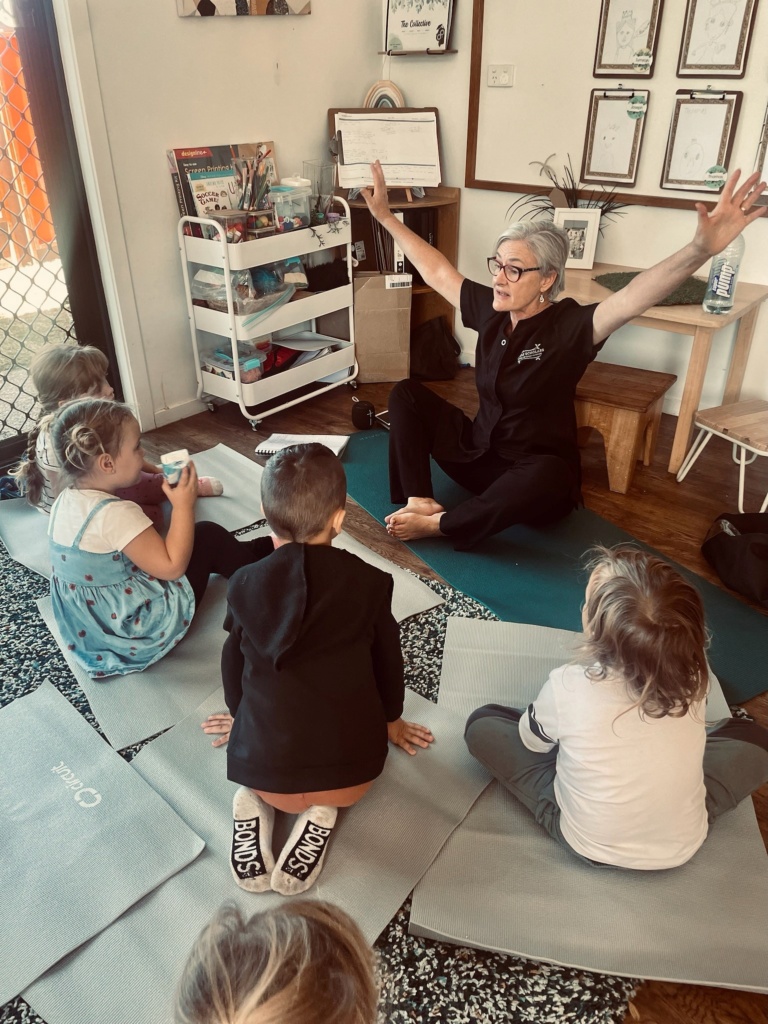
Annette once worked as an educator in our Ashmore campus, leaving to follow her passion of becoming a yoga instructor. However, achieving her dream meant she actually returned to us in a different capacity, she now leads yoga and meditation practice at several of our campuses and our support office.
We asked Annette how she got started practicing yoga, and what she saw as the benefits of mindfulness practices for children.
How did you get involved in yoga and what is it like to mix your passion for yoga with your great affection for young children?
It’s been so long that I don’t remember a time in my life when I haven’t practised some type of yoga/meditation. The short story is that my sister asked me to attend classes with her just after my second child was born. I’ve attended regularly ever since. My daughter’s almost 30 years old! Cliche as it sounds, Children are the future. They are inquisitive, flexible in mind and body and are ready to learn. It is vital to nurture this love of learning and develop a discipline of moving within their own space and taking time to be calm and think.
What are the emotional benefits of the practice?
Yoga and meditation practice take you inside yourself to be more aware of the movement of your breath, your body and your mind. We use the breath to be able to deal with situations calmly. One deep inhalation and a long exhalation remind us to pause to consider all the possibilities. Yoga teaches that all living beings are connected. This has a positive benefit for all living creatures. The children feel the difference between moving, being still and being relaxed.
What are the physical benefits?
Move it or lose it is the simplest answer. Children become aware of how much space they like at particular times eg. resting by themselves, partner poses, time to move with wide arms and stance or just a little space around their body. They develop concentration to maintain balance, they strengthen their muscles and become more flexible. We love moving rigorously and then freezing – the difference between effort and ease, mobile and relaxed.
What have you witnessed after teaching yoga with the children?
After teaching certain breathwork or postures, which I learned through the Zenergy yoga therapy course, the children settle more easily and are able to participate with more awareness. Some children are more aware of others and volunteer to be giving of themselves.
Do you have any advice for parents on bringing more mindfulness at home?
Take the time to be present to your children for a while each day, at least 10 minutes. No TV or telephones or music – just you and your child. Take a walk in nature, gaze at the stars, sit with a pet, cuddle on the couch and chat or be silent or breathe together. Listen, smell, taste, touch, feel … connect. This makes precious memories with your children.
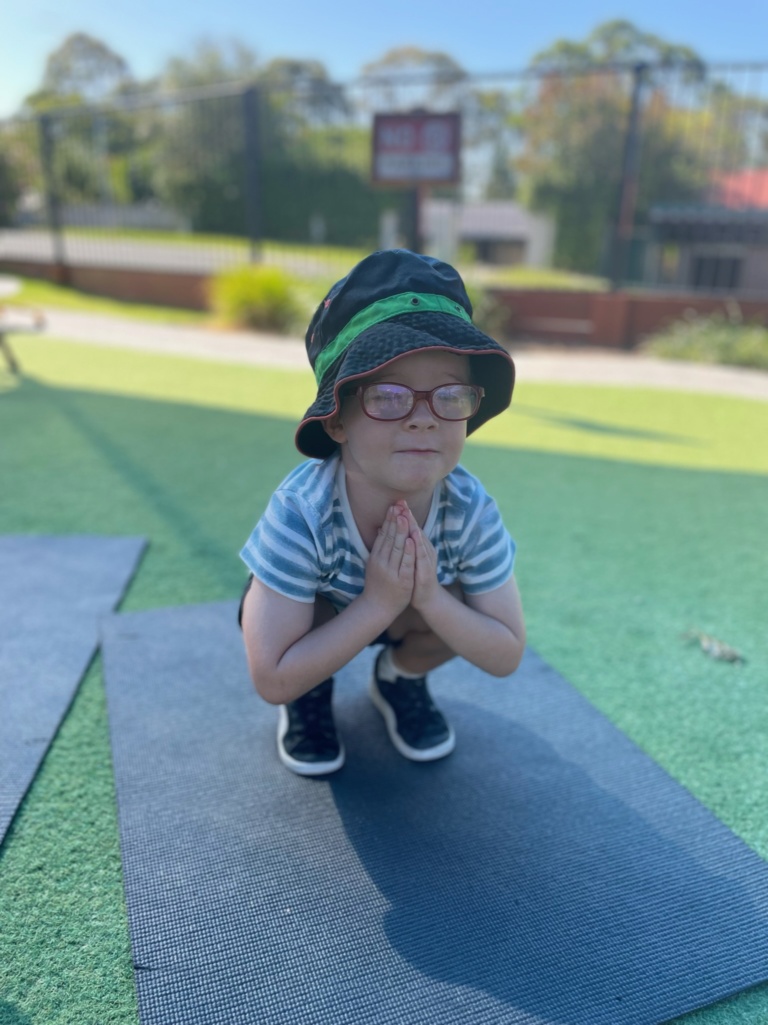
As mentioned, one facet of our mindfulness program is offering our little scholars yoga sessions delivered by experts like Annette, and as she says, yoga offers a multitude of benefits for emotional and physical development, backed by research.
On the physical side, yoga enhances flexibility, coordination, balance, and posture. Yoga requires our full attention, requiring us to focus on the present and be fully aware of what our body is doing at any one time. It also helps develop fine and gross motor skills, guiding us to learn to control breathing, our stance and where we’re putting our weight, and flowing through to the next posture.
On the emotional side, by focusing on movement, balance, breathing and everything else that yoga requires of us means that we’re fully present in the moment, practicing self-awareness and mindfulness, reducing stress and any outside ‘noise’, promoting relaxation, bringing a sense of calm and wellbeing. In turn, this means we’re developing emotional regulation and resilience.
For children who are just learning how to interpret and manage their emotions, this is a fantastic way for them to deal with life’s challenges big and small.
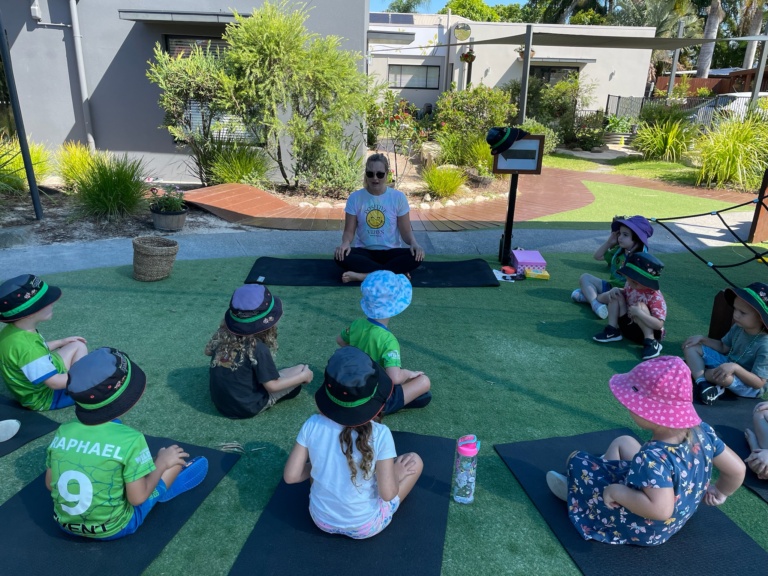
Another and even easier way to bring more mindfulness to our day-to-day that anyone, including children, can do is practice breathing techniques to calm the mind and body. Here are some of our favourite breathing techniques for children.
1. Ask children to lie on the floor and place a small object, such as a soft toy or bean bag on their belly. Get them to place their hands by their side and breathe normally, watching the object go up and down. You could count as they inhale and exhale ‘breathe in 1, 2, 3, breathe out 1,2,3.’
2. Print or cut out some square, rectangle or triangle shapes and give one to each child. Ask the children to trace their finger around the shape, breathing in while moving their finger along one edge of the shape, hold their breath for a few seconds before breathing out, while tracing around the next side of the shape. Repeat this a number of times.
Children can also use their own hand as the shape, using a finger on the other hand to trace up the side of a finger while breathing in and down the other side of the finger while breathing out, before moving on the next finger.
3. While sitting comfortably, model for the children how to create a circle shape with their hands and ask them to imagine that inside the circle is a mug of hot chocolate. Ask the children to breathe in slowly to smell the hot chocolate, and then blow out slowly to cool it down, repeating this a number of times.
Yoga for Children and Young People’s Mental Health and Well-Being: Research Review and Reflections on the Mental Health Potentials of Yoga: Ingunn Hagen and Usha S. Nayar, Department of Psychology, Norwegian University of Science and Technology, NTNU, Trondheim, Norway New School University, New York, USA
The effects of yoga on mental health in school-aged children: A Systematic Review and Narrative Synthesis of Randomised Control Trials, Kirti Khunti, Sadie Boniface, Emma Norris, Cesar M De Oliveira, and Nicola Shelton, University College London (UCL), London, UK, Kings College London, London, UK,
Brunel University, London, UK
Scoping Review of Yoga in Schools: Mental Health and Cognitive Outcomes in Both Neurotypical and Neurodiverse Youth Populations, Niamh Hart, Samantha Fawkner, Ailsa Niven, Josie N Booth, University of Edinburgh

The Gold Coast is known for its abundance of good food and stunning dining options, but when you have young children in tow – often the thought of dining out can be daunting. Thankfully, many local restauranteurs have heard the call of parents seeking family-friendly dining options. We’re now seeing dining venues with amazing menus, family-friendly fit outs and features to help keep the children occupied while you enjoy a hot meal. Whether it be a playground, a simple children’s corner, or open spaces to move around safely, there are plenty of choices for you to enjoy your next meal out. Here are my top six family-friendly dining venues on the Gold Coast that you should be sure to visit!
This shopping centre café is a hidden gem, saving the sanity of parents for many years now. With opening hours stretching from 5.30am – 9pm, you can often find those parents with early-risers enjoying a hot coffee at Café 63 in the early hours. Located in the incredible “Backyard” precinct at Westfield Coomera, the outdoor dining area overlooks a fun-filled obstacle course with adventure play suited to four-eight year olds. For the youngest children, a nearby splash pad and toddler sensory zone also serve as great spaces to stretch the legs while waiting for your meals to be served. The menu here is extensive and well-priced, including a fabulous children’s menu that will please everyone.
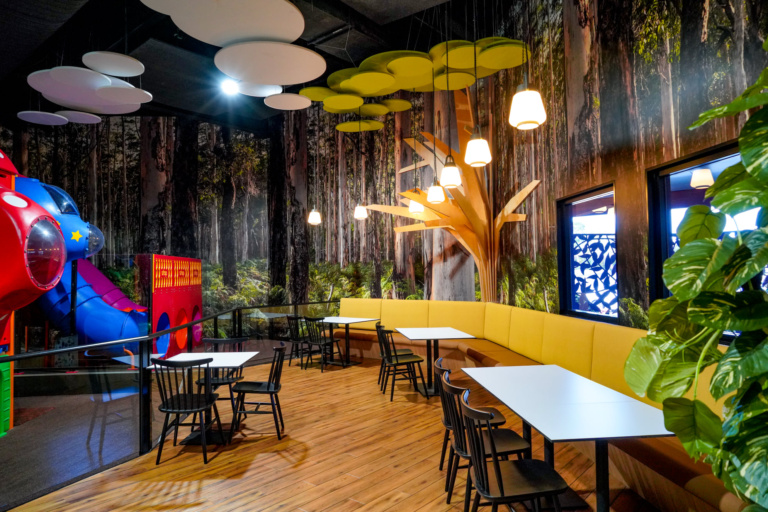
Here you will find a huge indoor children’s playground for four-12 year olds, with a family specific dining space attached. Separate from the rest of The Wattle Hotel’s restaurant, this glassed-off dining room overlooks the playground and contains about 15 tables. Here children can easily move back and forth between the playground and the table while their parents can see them at all times. There is a great children’s menu and delicious daily specials to enjoy, this is modern bistro dining that can be enjoyed by all the family.
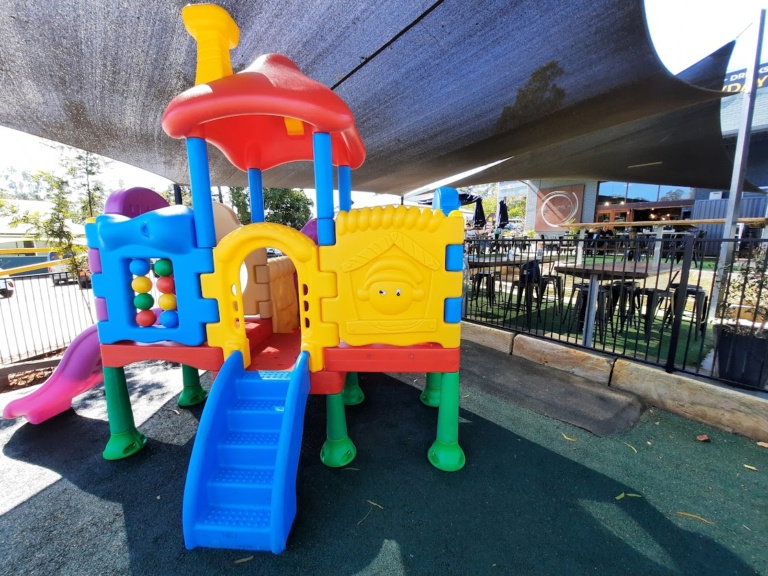
A café best known amongst the Coast’s cyclists thanks to its location near the Velodrome and bike shops, Cadence Café also caters beautifully to families seeking great food. Set across three terraced levels, the venue is connected by a central path and steps – at the top is the café, the middle level has plenty of dining tables and chairs, and the lower level is home to high bar tables overlooking a fenced children’s play space. All levels are shaded by a beautiful fig tree, have ramp access, and dogs are also welcome in the outdoor areas. Serving breakfast and lunch, the menu caters well to families, and you are sure to enjoy a delicious meal.
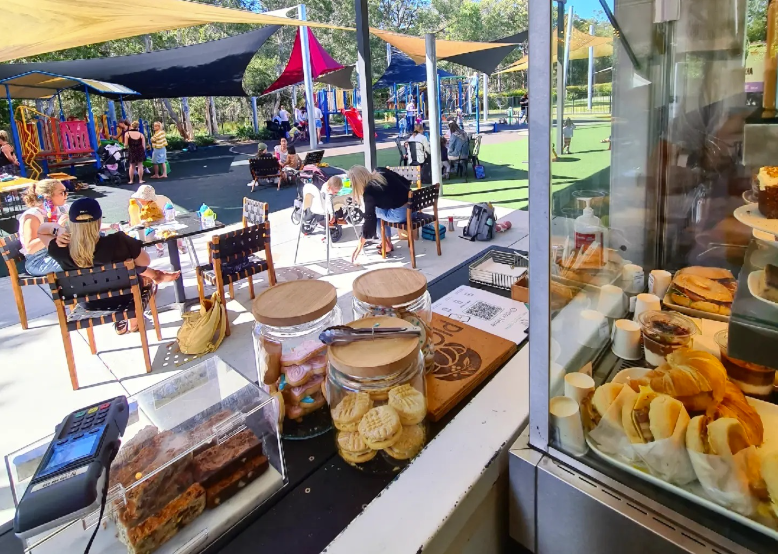
Just off the hustle and bustle of Olsen Avenue sits the Latte Lounge, a family-friendly oasis amongst the gum trees. Here you will find house-roasted specialty coffee and a delectable brunch menu, plus one of the best children’s menus you will find at a café. The open-air café is almost the second-best attraction, when you see the large, easily accessible playground right in the middle of the café. Designed for all ages, this fenced café and playground is covered by large shade sails and offers plenty of shady spots to enjoy your meal. With its central Gold Coast location, this is also an extremely popular spot for birthday parties and play dates. Thankfully, due to the size of the café and playground it never feels overly busy or crowded and is always a delightful outing.
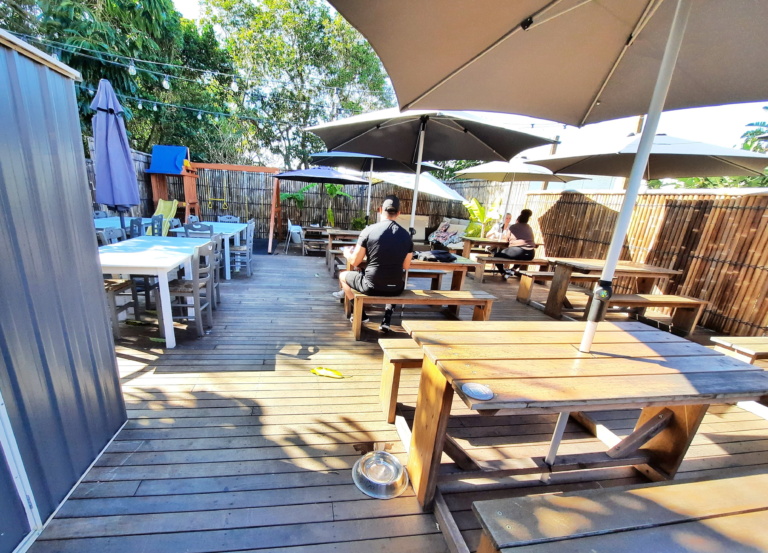
This hidden gem on the southern end at first appears to be a juice bar, but venture inside and you will find a breezy indoor/outdoor café with children’s playground! Popular with the locals, this unassuming little spot is filled with sunshine, great food and service with a smile. This is a family-run café with its roots in healthy superfoods that taste phenomenal. Dog friendly, the outdoor deck is the place to be, with easy line of site to the children’s playground. The café kitchen is only open Thursday – Monday, but the juice and smoothie bar is open 7 days.
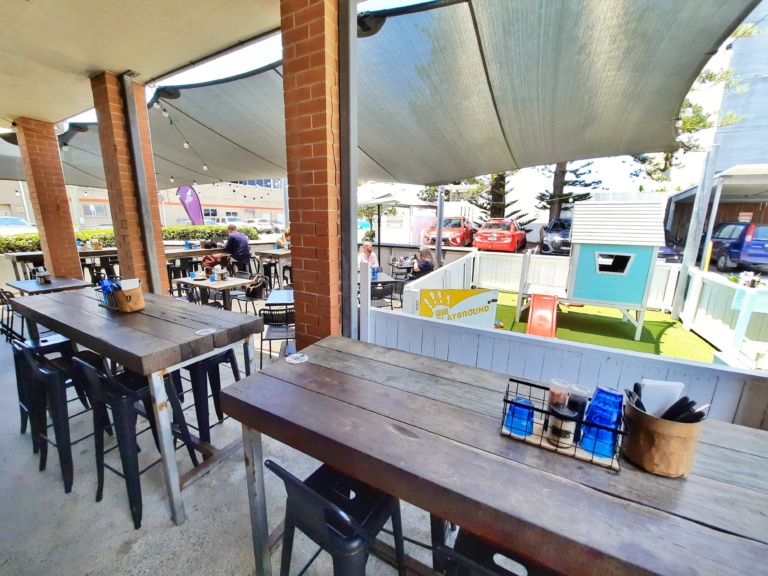
With beautiful coastal vibes, indoor/outdoor dining is essential on the Gold Coast, and BSKT serves it up perfectly. Located just steps away from the beach, BSKT has delicious food, ample seating and a fenced children’s play area. Pronounced biscuit, this menu is packed with vibrant colours and bold flavours, but also caters well to children. BSKT doesn’t take books and this spot is extremely popular on the weekend, but wait times are usually short. Be sure to grab a spot outside under the patio to have easy access to the play area! Why not pack the swimwear and walk over to the beach afterwards!
Find Lara’s recommendations at her website Mrs. Lardeedah.com, and follow her socials Facebook and Instagram
Children’s positive views of themselves as learners are more important than being told they are clever.
This insight from Nathan Wallis’s talk at the Australian Childcare Alliance (ACA) conference resonated with us, and we believe it’s valuable for parents to hear. Our intention isn’t to make parents feel guilty for praising their children’s intelligence. We understand that parents aim to foster a strong sense of self and ability in their children, and we fully support this. However, Wallis emphasises that before the age of seven, children don’t need to prove their intelligence. Instead, they need to develop learning skills through play and believe in their ability to learn. According to Wallis, more play and less structured learning before age seven leads to better outcomes in adulthood.
“To put it simply, before seven, it doesn’t matter how clever your child is. What matters is how clever your child feels and their disposition towards themselves as learners,” Wallis, an educator who focuses on neuroscience, explained on the Future Focus podcast.
“You’re better off having a six-year-old who can only count to 20 but thinks they’re a good learner than a six-year-old who can count to 100 but doubts their cleverness.”
Wallis highlights that free play boosts creativity and problem-solving, which are essential for intelligence. Letting children freely build, create, and explore supports flexible thinking and a positive learning mindset.
At the conference, which attracted hundreds of early childhood educators, Wallis offered advice on how to support children in their confidence and ability to learn:
Experts at Early Childhood Australia agree that children learn about themselves, others, and the world around them through play.
“If you provide your child with plenty of opportunities for playing, exploring, discovering their interests, solving problems, and tackling challenges, then you’ll be laying a strong foundation for building self-confidence,” says David Lyons, CEO of Nido Early School, in a post on ECA’s The Spoke blog.
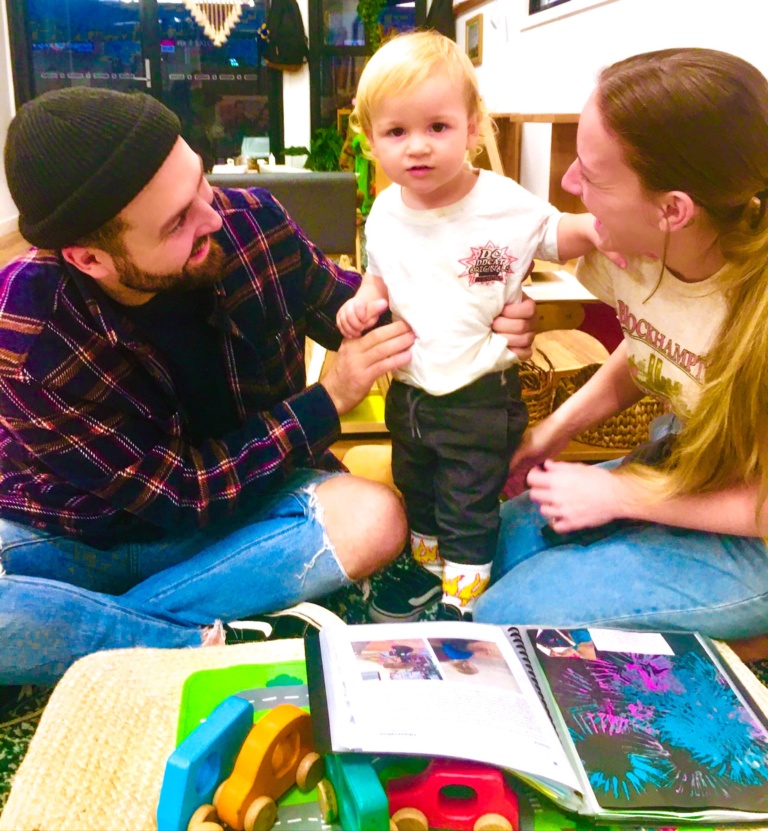
According to Be You, the national mental health and wellbeing initiative for learning communities in Australia, praise is most effective when adults are mindful of how and when they use it.
When praising children, Be You suggests focusing on their efforts and achievements.
“Praise that’s specific and acknowledges the process of completing an activity or solving a problem helps develop children’s learning and motivation. For example, you might say, ‘You put away your toys so nicely,’ ‘I noticed you were really trying hard at building that block tower,’ or ‘You’ve used so many bright colours in your painting.’ Children can then use this learning when they have similar experiences in the future.”
Lyons agrees and cautions against overpraising.
“Children need to discover and learn those things that give them personal enjoyment and fulfilment, not just do things to please their parents. Similarly, comparing a child to others can be detrimental to their confidence and self-esteem.”
Dealing with disappointment is also crucial for developing confidence.
“Everyone fails to achieve their goals sometimes – and this isn’t a bad thing. You can build children’s ability to deal with challenges by responding sympathetically and with encouragement, helping children focus on what they can change, and challenging ‘I can’t’ thinking by showing and saying you believe in them and reminding them of their achievements,” says Be You.
Wallis reinforces that play enables children to develop social, cognitive, and emotional skills through their own interests and in creative and innovative ways.
“Play-based learning teaches creativity, which is fundamental to growing intelligence and the ability to problem-solve. When children can take their time and make multiple attempts before achieving success, they build resilience and other important skills needed later in life,” says Wallis.
Supporting children in developing a positive self-view as learners is crucial, especially in their early years. Emphasising the importance of play over structured learning fosters creativity, problem-solving, and resilience. By providing nurturing relationships, paying attention to their efforts, and creating flexible learning environments, we can help children build the confidence they need to thrive.
As Nathan Wallis and other experts highlight, the goal is to make children feel capable and enthusiastic about learning. This foundation will benefit them not only in school but throughout their lives. At Little Scholars, we encourage our little ones to play, explore, and believe in themselves – because how they see themselves as learners today will shape their success tomorrow.
Ipswich! You may have heard Little Scholars School of Early Learning is coming to you! We’re thrilled our newest campus is coming to Ipswich in early 2025. As we prepare to open our doors, we want to celebrate by sharing some of our favourite family-friendly activities in Ipswich, because we’re not just about early learning, we adore our families and our Ipswich community!
We think Ipswich has really stepped up its game when it comes to offering some great entertaining offerings for the young, and the young at heart.
Images and information courtesy of the organisations mentioned below, as well as Brisbane Kids, Ipswich First, Families Magazine and Must-Do Brisbane.
Did you know Ipswich has Australia’s only public library dedicated to children? It features a specially designed catalogue with over 35,000 books just for children, and unique multi-reality interactive experiences.
The Ipswich Children’s Library is designed to be an interactive and engaging space for children. It features various zones with elements that encourage exploration and active participation. Highlights include a series of colourful tubes where children can send fabric pieces flying through the air, large interactive screens, and colouring tables where children can scan and watch their decorated fish swim on a screen. The library also offers cosy reading nooks, a gaming touch screen with STEAM-based puzzles, and a unique Reading Tree with a cushioned tunnel for reading. The space is filled with natural light, thanks to its floor-to-ceiling windows overlooking the Nicholas Street Precinct and landscaped gardens.
The library is open seven days a week and hosts regular, child-focused programs and events and special tech adventures just for little ones!
Hop aboard the Queensland Pioneer Steam Railway in Ipswich for a fun-filled family adventure. Ride in beautifully restored vintage carriages and explore the rich mining history of the area. As the train chugs along, you’ll pass by old mine ruins and vintage equipment, giving you a glimpse into Ipswich’s past. It’s a perfect outing for families to enjoy a unique and educational experience together.
Attention all young aviation enthusiasts! Visit the RAAF Amberley Aviation Heritage Centre near Ipswich to see some amazing aircraft up close. Walk around and marvel at the F-111 with its famous “dump and burn” feature. Check out the WWII Boston Bomber, Vietnam-era Canberra bomber, Caribou airlifter, Sioux and Iroquois helicopters, and WWII Jeeps. You’ll also see cool Sabre and Mirage fighter jets. Learn about the RAAF’s important role in history with interactive exhibits and displays. It’s a fun and educational trip for the whole family!
Check the website for times to visit.
Ipswich Art Gallery takes play seriously! Its goal is to create dynamic pathways for lifelong relationships with art.
It’s a visual arts and social history museum presenting a dynamic program of exhibitions and heritage displays with complementary workshops, performances and an extensive program for children and families. We also adore that the gallery guides itself by philosophical principles for its children’s gallery, highlighting that learning begins with creative play, and that children are important members of our community who should be encouraged to express and develop their ideas and views.
Located in Queens Park, the Ipswich Nature Centre offers a delightful experience for families and nature enthusiasts. This free-entry zoo showcases native Australian wildlife, including kangaroos, emus, wombats, and bilbies. Wander through lush gardens, see barnyard animals, and enjoy the aviary filled with colourful birds. The centre provides an educational and fun outing, promoting conservation and the beauty of local wildlife.
For more information, visit Ipswich Nature Centre.
Discover the rich history of Ipswich at the Cooneana Heritage Centre, home to the Ipswich Historical Society. Explore historical photographs, artifacts, traditional crafts, and coal mining displays that highlight the region’s diverse past. Visit Cooneana Homestead to see early Ipswich life, and Jim Donald House, a well-preserved miner’s cottage from the 1890s. Experience an old-fashioned classroom in the schoolroom and watch blacksmiths at work in the blacksmith shop. Perfect for history enthusiasts and families alike.
Take an eye-opening journey through Queensland’s history at the heritage-listed Ipswich Railway Workshops. The award-winning Queensland Museum Rail Workshops is a must-visit for anyone in Ipswich. Once employing over 3,000 railway workers and making it Queensland’s largest employer at the time, this historic site now blends the charm of the past with modern technological advances.
Explore the old boilershop, home to beautifully restored locomotives and carriages, and marvel at Queensland’s largest model railway, showcasing detailed scenes of the state. Perfect for visitors of all ages, this museum brings history to life.
Check out Faye Carr Park in Ripley, a rocket ship-themed playground designed for the whole community.
The standout feature is the impressive trio of red and green pods, which have become a landmark of the Ecco Ripley development since its opening in 2018. These custom-designed pods by Playscape Creations are a first for Australia, offering sensory delights like cogs, steering equipment, and rainbow spinning wheels, all connected by a bridge. The exterior is just as engaging with ladders, slides, staircases, and fireman poles for endless fun.
For younger children, there’s a separate toddler playground complete with a mini slide, ladder, and puzzles. The area also includes a five-person swing circle, a rotating net climber, a see-saw, and a double-track flying fox for inclusive play.
Sports enthusiasts will enjoy the middle section of the park with multipurpose fields for soccer, rugby, and basketball, as well as an outdoor workout zone. Picnic shelters and BBQs make it perfect for a family outing.
Over 20 developmental activities between the main and toddler playgrounds promote educational play in a fun outdoor setting. The park also emphasises social play with shared swing circles, rotating net climbers, and multi-track flying foxes, encouraging greater participation.
The parklands are wheelchair and pram friendly, with accessible pathways connecting all areas. The seated playground equipment, including an adaptive swing, see-saw, and net climber, are designed for inclusivity.
Faye Carr Park Features:
A multi-million dollar playground that is accessible and engaging for all ages is the incredible result of a consultation between locals and Orion Shopping Centre.
The main attraction is a vibrant activity centre with a tower reaching 11 metres high, accessible via internal ladders or a 16-metre Sky Walk bridge offering a birds-eye view of the playground below. Two enormous tunnel slides flank the tower, perfect for young thrill-seekers. Note that the play area is not fenced from the nearby car park, so close adult supervision is necessary.
For children who prefer to stay grounded, the playground features in-built trampolines, mountaineering ropes, and a large climbing net tunnel. A wheelchair-friendly merry-go-round promotes inclusive play.
The toddler area includes slides, stairs, a rock climbing wall, a fire pole, a colourful see-saw, and a cognitive play hut with educational activities. Swings are available for both independent children and those needing assistance. Most of the playground is covered by shade sails or roofing for sun protection.
Lobley Park is a charming, aviation-themed park that pays tribute to Ipswich’s Air Force heritage. Children will love playing in the aeroplane structure, exploring the air traffic control tower, and enjoying the parachute swings. The park also offers ample space for running around, traditional playground equipment like swings and slides, and a story time area. Perfect for picnics or parties, Lobley Park features barbecues and tables. It’s a fantastic spot for family fun, with memorable attractions that children will adore!
Located just 15 minutes from Ipswich city, the recently upgraded Redbank Plains Recreation Reserve has become a popular community hub for gathering, playing, socialising, and relaxing.
The central playground features a 9-metre tall adventure tower made of cargo netting, platforms, and ladders, offering a vertical thrill for older children. Climbers can choose between a speedy tunnel slide and a twisty tube slide. The roped exterior allows for easy parental supervision.
The reserve also boasts a 20-metre high ropes course, challenging balance, strength, and coordination, with opportunities for adults to assist younger climbers. Additional features include a giant rotating bird’s nest swing, a multi-bay swing set, and sensory spinners.
A dedicated toddler playground caters to ages one to five with accessible platforms, ground-level activities, gentle slides, and imaginative play areas. Essentials such as swings, see-saws, bouncers, and an inclusive carousel are built on a soft base with ample shade sails. Nearby seating is available for supervision and picnics.
The reserve also includes a newly renovated skate park, suitable for skaters of all levels, adjacent to a large grassy field ideal for soccer, cricket, or kite flying.
Additional features:
The rapidly expanding Ripley Valley is home to several state-of-the-art playgrounds, and the Splash ‘n’ Play Adventure Park is a standout. Designed for all age groups, the park features towering sky cabins at 7.5 metres high, connected by enclosed rope bridges for safety. Children can exit the playground via a straight tubular slide, a twisted mega slide, or by climbing down netted ladders. This section is ideal for children over 5, though confident younger climbers can also enjoy it.
The park also includes a flying fox, a small swing set, and toddler-friendly options in the neighbouring play area.
Directly across from the playground is a shaded, multi-age Splash ’n’ Play area with water fountains, movable sprayers, button-controlled jets, and waterfall arches. This area is divided into two sections, allowing smaller children to play safely away from the larger splash zone. The non-slip rubber base and ample seating enhance safety and supervision.
For families, the Forty West Café at the top of the adventure park serves delicious coffee and food daily. A takeaway coffee is ideal, as a tall garden partially blocks the view between the café seating and the playground below.
As you approach the Sunshine Park playground, the central tower immediately catches the eye. Standing at 8 metres tall with three levels, it invites children to come and play. Inspired by the towering trees and creeping vines of a rainforest, the structure is both impressive and engaging.
Children can access the different levels through vertical climbing tunnels, ball pommels, and nets. The internal decks are inclined to provide an extra challenge. Once at the top, the 4.5-metre tunnel slide offers a thrilling descent back to the ground.
In the junior play area, there is a cubby-style fort with interactive elements decorating the walls. A small slide is easily accessible for little ones using stable stepping platforms.
For those who love to run or play ball sports, Sunshine Park features a basketball half-court, a handball court, and a generous kickabout area. There’s also a small pump track designed to manoeuvre around without pedalling, providing an additional challenge for competent riders and a fun spot for little ones to push their diggers down the hills.
Features:
Sunshine Park is an engaging and versatile playground, offering a variety of activities for children of all ages.
Tucker Family Park is one of the best parks in Ipswich for children of all ages and abilities, set in a beautiful, nature-filled environment. This park offers a range of exciting features:
Key Attractions:
Playground Features:
Tucker Family Park is perfect for those looking to immerse themselves in nature while enjoying a variety of activities. Whether it’s exploring the extensive playground, participating in sports, or simply taking a peaceful walk, this park has something for everyone.
Whiterock Adventure Playground and Splash Pad in Ripley Valley is quickly becoming a top summer destination. The standout feature is the intriguing “play curl” structure, accompanied by water play and natural exploration zones.
Upon entering the beautifully designed space, the first thing you’ll notice is the huge and uniquely shaped “play curl,” which looks more like a sculptural masterpiece than a playground. The Australian-first design is over 16 metres long and can accommodate up to 40 children at a time with its mixture of net climbs, rock climbing holds, rubber ramps, balancing ropes, and suspended resting areas. This area is best suited for children aged 5 to 12, though confident younger climbers can also enjoy it.
Directly across from the playground is a mostly shaded, zero-depth Splash ’n’ Play area. It features water fountains, movable wiggly sprayers, button-controlled jets, and waterfall arches. Smaller children can safely enjoy water play away from the larger splash zone. The area has a non-slip rubber base for safety and ample seating for supervision.
Rounding out the play space are other playground favourites, including an embankment slide, swings, a seesaw, educational games, and an accessible carousel. The parklands are also equipped with full picnic amenities, making it an excellent choice for birthday parties and family gatherings.
The “play curl” offers a foundation for imaginative play. Its abstract design creates a sense of mystery and encourages problem-solving. Running adjacent to the curl is a dry creek bed with cylindrical stepping stones, providing a nice contrast to the metal and steel of the playground and encouraging a nature-style play. The different ground textures, equipment heights, and water play combine to form a multi-sensory experience.
Whiterock Adventure Playground is located on even terrain with connecting paths, making it easy to navigate with prams. The ground-level carousel spinner is designed for inclusive play. Disabled toilets and a baby change room are available on site.
Additional Features:
Whiterock Adventure Playground is perfect for families seeking fun and adventure, with diverse activities for children of all ages.
Ipswich has a number of incredible parks and reserves for families to explore and make memories together.
Conveniently, the Naeus app makes it easier to discover Ipswich’s natural areas with GPS guided maps of walking tracks that include distance and grading information.
The Naeus Explore app enhances your outdoor adventures with several interactive features. It provides real-time weather updates and has a native plant identification tool—just take a photo, and the app will instantly provide details about the plant. Additionally, the app uses geo-fencing technology to automatically highlight points of interest near you. As you near important sites, like a historical tree or scenic lookout, the app notifies you with detailed information.
The app is also designed to be collaborative. You can report any issues, like fallen trees, directly to the local council through the app. Moreover, you’re encouraged to contribute by adding new points of interest that you discover, such as notable wildlife sightings or unique natural formations.
Queens Park, a jewel in the heart of Ipswich, holds profound cultural and historical significance not just locally, but for all of Queensland.
Established in 1842 and with its architectural roots dating back to 1862, Queens Park is the first and one of the most iconic parks developed in Queensland. It offers visitors a unique blend of historical elegance and contemporary amenities, making it a perfect destination for both relaxation and exploration. Challenge your little ones to spot animals such as Wallabies, Eastern Quolls, Wombats, Frill Neck Lizards, Emus and more!
Nestled near Ipswich city centre, the park provides a convenient escape with its shady gardens and tranquil spaces ideal for a leisurely lunch or a peaceful stroll.
Queens Park is replete with attractions that cater to all ages and interests: from the meticulously maintained formal garden beds and the serene Nerima Gardens, reflecting the beauty of Japanese landscape design, to the engaging Ipswich Nature Centre. The park also boasts modern play areas for children, the rustic charm of Bush House and Bush Chapel, sports facilities including the Queens Park Croquet Hall, and a café. Additionally, the Environmental Education Centre offers learning opportunities about local flora and fauna.
Featuring water parks and lush gardens, Robelle Domain is an ideal spot for cooling down on hot days and enjoying outdoor concerts and events.
This huge park is spread over 24 hectares and comprises over 11km of boardwalks, sporting fields, walking tracks and playgrounds, as well as the stunning Orion Lagoon.
This park is a paradise for families and the play area boasts features that include interactive equipment that combines play with the excitement of electronic gaming and a zero depth water park with a large tipping bucket, jet sprays and spouts.
The park also features shady picnic areas, land art pyramids and an early evening sound and light show to cap off your day.
Flinders-Goolman Conservation Estate is a 2,200 hectare estate and is popular for a wide range of activities including bushwalking, horse-riding, mountain biking, birdwatching and Traditional Owner cultural practices.
To explore the area, there are many trails available. The shortest trail is just 560m through bush tucker gardens, and a few other trails that are about two to three kilometres in length, which might be doable for little ones. They’ll be excited to spot wildlife such as king parrots, willy wagtails, kangaroos and wallabies.
With its breathtaking landscapes, a wide variety of flora and fauna, and deep cultural heritage, White Rock – Spring Mountain Conservation Estate offers an ideal setting for a family bushwalk and picnic. Located just 20 minutes from Ipswich and 35 minutes from Brisbane, the estate is conveniently accessible while still providing a peaceful escape from urban life. There are boardwalks, caves, and lookouts, all along well-maintained paths with clearly marked trails and benches for resting tired legs along the way.
Most walks are relatively easy and flat, with dirt tracks and some boardwalk sections. However, some steep inclines, rough terrain, and loose surfaces also exist.
A few short routes for little legs include:
Bluff Lookout Circuit, 200m one way
Little White Rock Lookout Circuit, 200m one way
Six Mile Creek Boardwalk, 300m one way
Little White Rock Track, 600m one way
Six Mile Creek Track, 1.4km return
Toilets and picnic shelters are positioned by the parking area with grassy areas where you can set up a picnic blanket.
Located right in the heart of the city, Denmark Hill Conservation Reserve is a favorite destination for birdwatchers and day-trippers. The reserve is well-equipped for visitors, featuring BBQ facilities, toilets, picnic tables, and ample parking. It offers five short walking tracks suitable for a quick escape into nature. The 200-metre Waterfall Track is wheelchair accessible, making it easy for everyone to enjoy. For those seeking a longer walk, Bluey’s 800m Circuit and the Water Tower 800m Circuit are the most extensive paths available. You can find the main entrance and parking area directly opposite the corner of Deebing and Clay Streets, just a three-minute drive from Ipswich CBD.
At the Quarry Street entrance, you’ll find a wooden playground which fits in with its natural surroundings. The small playground consists of a climbing net, birds nest swing, balance beam and obstacle course made from ropes and stepping logs.
Hardings Paddock offers a serene bush camping experience close to the city, yet feels a world away. With only eight spacious campsites, you’ll enjoy privacy and tranquility. Facilities include long drop toilets, shower cubicles (bring your own water), free barbecues, and a fire pit. Suitable for tents, caravans, and motorhomes, it even has a holding yard for horses.
The nearby Flinders-Goolman Conservation Estate provides excellent hiking trails across volcanic peaks and slopes, making it perfect for nature lovers and adventurers.
Just a short drive away from Hardings Paddock, you’ll find Ivory’s Rock – a 600 hectare property, backing onto the Flinders-Goolman Conservation Estate and surrounded by native bushland. It’s an excellent option for those campers that prefer a few more modern amenities than what Hardings Paddock offers.
Ivory’s Rock is a private property that offers spectacular views of the surrounding mountain peaks. Animal lovers will be in heaven here with wallabies and kangaroos regularly hopping about the property. You may even be lucky enough to spot a koala or two.
Campsites at Ivory’s Rock are suitable for all kinds of campers, including those with tents, caravans or motorhomes. There is a choice of powered and unpowered sites, which all have access to laundry and bathroom facilities. Other amenities include gas barbecues, communal fire puts, water and even free wifi.
For those new to camping and don’t have their own gear, at Ivory’s Rock, you can even request a site that has all the camping gear set up for you. Then, all you have to do is arrive and relax. Of course, there’s no packing up either – that’s camping in true style!
Ipswich Caravan Village offers a tranquil bushland setting with options for overnight, tourist, and permanent accommodation. Choose from powered and unpowered sites for caravans and campers, or stay in one of our air-conditioned cabins, available for singles, doubles, families, and groups.
Conveniently located near shopping centres, restaurants, sporting venues, Willowbank Raceway, tourist attractions, and heritage sites, our park is perfect for exploring Ipswich, Queensland’s oldest provincial city. Enjoy the blend of natural beauty and nearby amenities during your stay.
Rosewood Showgrounds Camping Facility is located in the picturesque township of Rosewood, 20 minutes west of the Ipswich CBD and one hour from Brisbane making it the perfect place to set up camp while you explore South East Queensland.
Rosewood has been designated as an RV Friendly Town and the Showgrounds is a short drive or walk to a supermarket, chemist, doctors, coffee shops, and the electric train to Brisbane.
The Showground has 28 powered sites (some with access to sullage) and 17 un-powered sites . Other amenities include toilets, showers and free dump point and potable water.
Nearby attractions include the historic Rosewood township, Cobb & Co Tourist Drive and historic coach display, the heritage Rosewood Railway and museum, St Brigid’s Catholic Church (the largest timber church in the southern hemisphere), Grandchester Model Steam Railway, Spicers Hidden Vale and the Hidden Vale Adventure Park, Queensland Museum Rail Workshops, Ipswich Art Gallery and Ipswich Nature Centre.
There you have it! We hope you enjoyed our list of the best things to do with your family in Ipswich. If you’re after the best childcare in Ipswich, look no further than Little Scholars Karalee, due to open early 2025!
Contact us or book a tour today to ensure your little one gets the best start to life that they can.
Do you have a playground you think should be here? Let us know on our socials @littlescholarsearlylearning!
*Images courtesy of Ipswich city council, mrslardeedah.com, romethegnome.com, and Brisbanekids.com.
There you have it! We hope you enjoyed our list of the best things to do with your family in Ipswich. If you’re after the best childcare in Ipswich, look no further than Little Scholars Karalee, due to open early 2025!
Contact us or book a tour today to ensure your little one gets the best start to life that they can.
Do you have a family friendly Ipswich place to visit that should be on this list? Let us know on our socials @littlescholarsearlylearning!
*Images courtesy of Ipswich city council and Brisbanekids.com.
Over the past couple of months, we have started to launch woodworking stations at our campuses! But why, you may ask. It’s dangerous! They could get hurt! At Little Scholars, we actively guide children through ‘risky’ activities to build up their skills, confidence, and resilience. Engaging in woodworking helps children learn to assess and manage risks, develop fine motor skills, and boost their creativity and problem-solving abilities. By introducing these activities in a controlled and supervised environment, we ensure they gain valuable life skills while staying safe.
Woodworking is an excellent way for children to exercise their creative, practical and critical thinking skills. It allows them to express their ideas and figure out solutions to their projects.
As they measure, cut, and assemble pieces of wood, they enhance their hand-eye coordination and fine motor skills. These activities require precision and control, which are crucial for writing, drawing, and other tasks. Furthermore, using tools like hammers, saws, and sandpaper teaches them how to handle and manipulate objects with care and accuracy.
Guiding children through woodworking activities helps build their confidence and resilience. Completing a woodworking project, no matter how simple, gives children a sense of accomplishment and boosts their self-esteem. They learn that they can create something tangible and useful with their own hands. Additionally, the process often involves overcoming challenges and solving problems, which teaches persistence and resilience. These qualities are essential for tackling academic challenges and life’s obstacles.

Our little scholars begin their woodworking projects by making a plan. This may look like drawing out their project, or making a model out of cardboard or building blocks, discussing with their friends and educators what they’d like to build, how they’d like it to look, what tools they need in order to make their design come to life, and figure out any risks there may be and how to reduce chances of hurting themselves.
Introducing woodworking in a controlled environment allows children to learn about risk management. They are taught how to use tools safely, understand the potential dangers, and take appropriate precautions. This hands-on experience with ‘risky’ activities helps them develop a healthy respect for safety and risk assessment. They learn to think ahead, plan their actions, and make informed decisions to minimise risks, which are valuable skills both in and out of the workshop.
Some of their documented conversations with educators have included:
How can we make sure we are safe when using the tool table?
“You have to wear safety glasses.”
“If you step on a nail you can hurt your feet.”
“It can’t be too busy, I might knock something over or into someone and hurt them.”
What do you do at the tool table?
“I can measure the wood.”
“When I’m at the table I use the screwdriver.”
“I use nails to put in the wood.”
How does it make you feel when you build at the tool table?
“I like tools because I can screw something in.”
“I feel happy because I can make something.”

Woodworking supports creativity and problem-solving skills. As children design and build their projects, they must think creatively to overcome design challenges and find solutions. This process encourages them to experiment, explore new ideas, and think outside the box. The ability to approach problems creatively and develop innovative solutions is a real skill in today’s world, where adaptability and innovation are highly valued.
In addition to the practical skills, woodworking integrates educational concepts such as maths and science. Measuring pieces of wood, calculating dimensions, and understanding geometric shapes are all part of the woodworking process. Children also learn about the properties of different materials and the principles of mechanics and engineering. This hands-on application of academic subjects helps to reinforce their learning and makes these concepts more tangible and understandable.
By providing children with the opportunity to engage in woodworking, we are equipping them with a wide range of skills and experiences that will benefit them throughout their lives. Through careful supervision and guidance, we ensure that they can enjoy the benefits of this fun activity safely.
Our Parkwood little scholars are not only a part of our newest intergenerational program, they’re helping contribute to important research that looks at how intergenerational bonds support children’s emotional wellbeing as well as that of older people who often experience feelings of loneliness in their later years. This latest study by Griffith University will run over 24 weeks in three eight-week pairings with eight children and eight grandfriends.
Researchers at Griffith University, led by Professors Gaery Barbery and Anneke Fitzgerald, are evaluating the intergenerational program, proudly hosted by Bupa Agedcare Group Limited at Bupa Runaway Bay.
“The program is all about making connections,” according to Professor Barbery, project lead for Griffith University.
The project will measure loneliness, resilience and general wellbeing of the aged care residents using the De Jong Scale of Loneliness, he says.
Isolation and feelings of loneliness are a serious threat for older people, because they’re more likely to live alone, lose family members and friends, suffer from chronic illness and hearing loss. Statistically, one in four older (over 65) Australians live alone. Of those who live alone, according to a 2015 Australian Bureau of Statistics survey, about 12 per cent didn’t receive visitors in a three-month period, and older men were reported to be less likely to have been visited, at 17 per cent.
From the viewpoint of the children, their educators will mark and monitor the project feedback and how it measures against set parameters using the Leuven scale.
“It measures children’s wellbeing and involvement based on observations from staff. There’s also a reflection manual for staff (educators) to offer their perspective of the program, along with a program evaluation survey,” according to Professor Barbery.
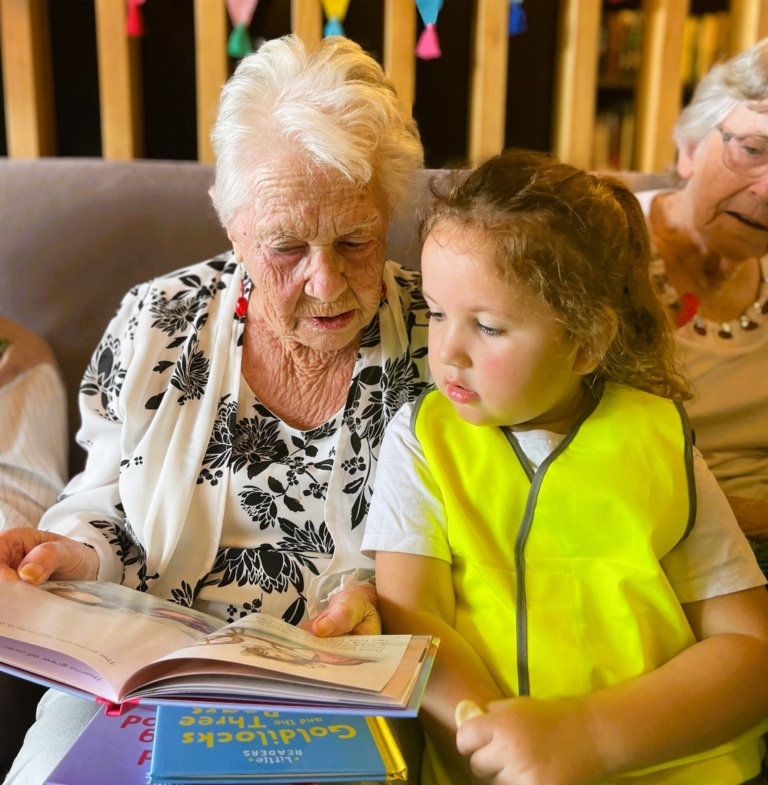
The Bupa residents were delighted to join the research project, all having different reasons for wanting to be a part of the program.
“To see the little ones again, because my grandchildren are all grown up, and all littler ones who’ve been born are overseas, so it’s nice to see little people again,” says Lorette.
“I like little children, and I’ve got a baby great-granddaughter but she’s in New Zealand. So this is a way to spend time with small children. They’re so cute, they’re gorgeous!” Pam says.
Being a half a world away from her family has been hard for Beverley.
“I was a teacher in preschool. I just love kids,” she says. “I have two grandchildren in England, I miss having my family nearby, they come but it’s so far away and a lot of money.”
For Joan, who turned 95 the day before the research project kicked off, she hadn’t considered how much she’d enjoy the visits.
“To start with, it was just an activity, but I found it was so interesting watching these children.”
And Joan says she’s impressed by the maturity of the children, even though they’re only four and five years old.
“They’re much older than we were mentally. Probably because as a society we do more adult things with them. They do seem very advanced to me. It’s a totally different ballgame than when I was a child,” Joan says with a laugh.
Of course, we had to ask our little scholars what their takeaway of the program has been so far, and their answers were predictably unpredictable.
This project is enthusiastically supported and funded by Bendigo Paradise Point Community Bank.
“The Bendigo Paradise Point Community Bank is a registered social enterprise supporting the Gold Coast Community,” says William Matthews, who is proud to be on the Board of Bendigo Bank Paradise Point, as well as principal and director of client operations for Sovereign Family Offices.
Will says he heard Professor Fitzgerald speak at the Australian Institute for Intergenerational Practice (AIIP) meetings that he regularly attends, and was inspired to see how Bendigo could help.
“As a social enterprise we reflect the values of our community, customers and staff. We see our support of Intergenerational Practice in the community as an essential component to strengthening our community by breaking down the barriers in how our most venerable people in society are cared for. We are extremely grateful for Little Scholars, BUPA and Griffith University for championing this project and supporting a future that includes people from every stage of life.”
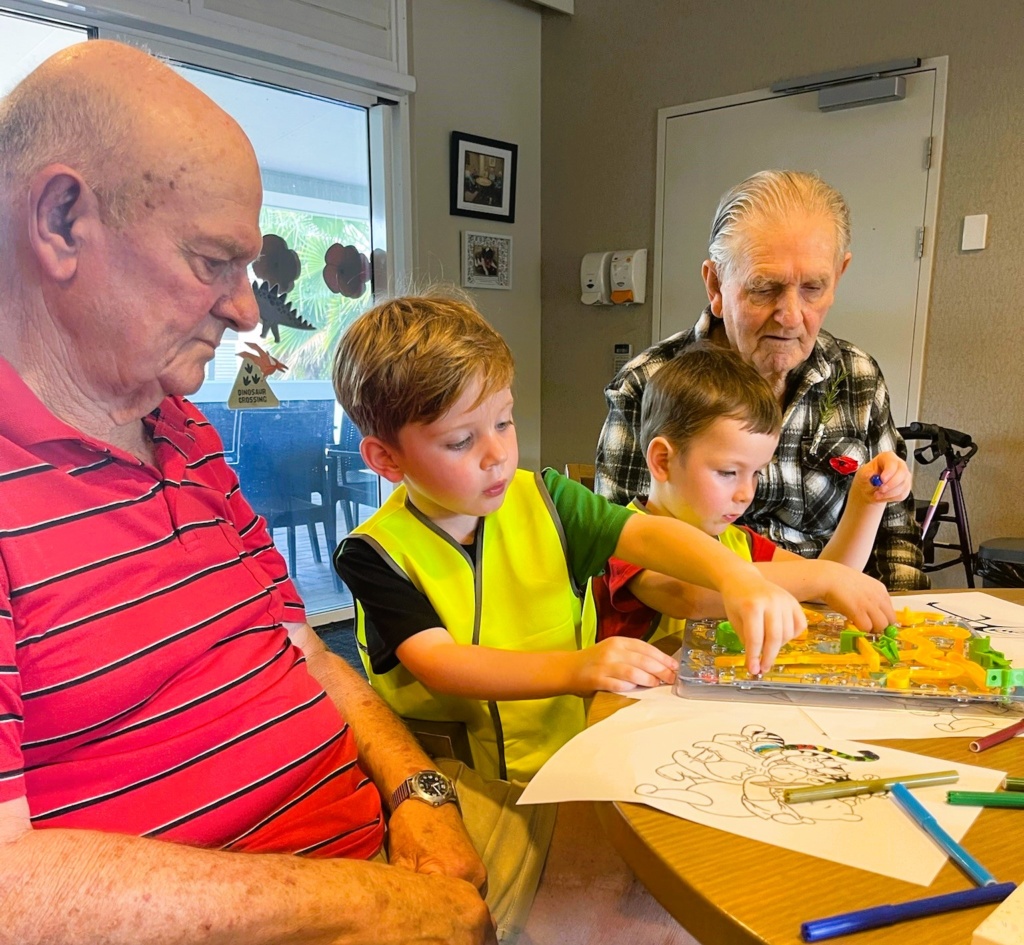
Mandy Kaur, general manager of Bupa Runaway Bay, says once her team heard about the project, they were very quick to jump to be a part of it.
“We are all excited to continue this project,” Mandy says. “I believe these visits can foster a sense of joy, connection, and purpose for both the children and the elderly residents.”
The benefits of intergenerational programs in aged care are numerous, according to Mandy.
“Combating loneliness, fostering empathy, promoting social engagement, and enhancing cognitive function for older adults.
“They also provide younger generations with valuable life lessons, respect for elders, improved social skills, increased empathy and understanding towards older adults, enhanced emotional development, and opportunities for learning and cognitive stimulation.”
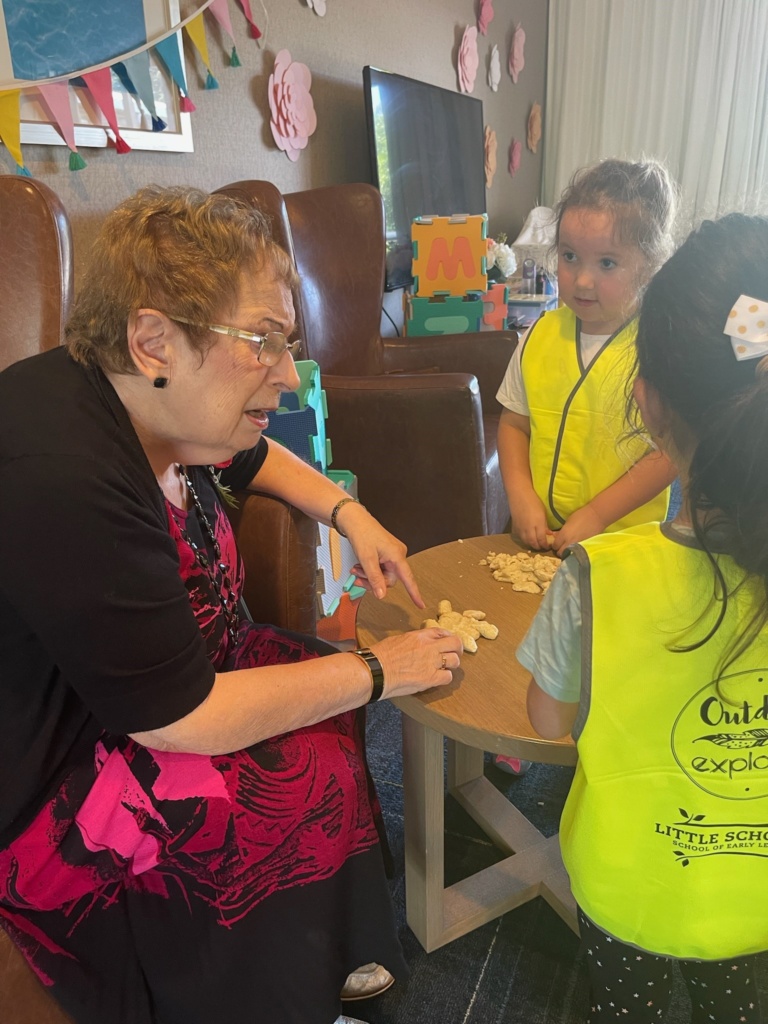
“The children are loving the visits so far,” according to Amy, campus manager for Little Scholars Parkwood. “They have developed some beautiful relationships with some of the residents and regularly discuss throughout the week their experiences with them.
“After week two, the children knew their grandfriends by name and were buzzing with excitement to see them again, which I think shows just how beautiful incorporating an intergenerational program can be!”
Professor Fitzgerald says programs like intergenerational ones further support the old proverb that it takes a village to raise a child.
“This research has the potential to make a huge impact on society, reconnecting the young and old,” she says.
“It is not just their eyes that lit up, but also their brain. There is nothing more satisfying than seeing older adults and young people connect for mutual benefit. So exciting to see how hearts are filled with joy.”
“I’m proud Little Scholars has the opportunity to assist in important research that looks at the benefits to both the young and the young-at-heart. Our little scholars are in the most important years of their life when it comes to brain development, and the lessons they learn from their grandfriends they can carry with them their entire lives,” says Jae Fraser, founder of Little Scholars.
Intergenerational relationships is something Jae is passionate about, and it’s been part of Little Scholars nearly since its inception 10 years ago.
“We’re honoured Griffith University researchers contacted us as leaders in the early education field, and we’re thrilled so many of our Little Scholars families jumped at the chance to participate. I can’t wait to see the results of this study when it concludes, and I hope it further highlights the proven positive impact of these relationships, showing how they enrich the lives of both children and older adults.”
At Little Scholars School of Early Learning, we’re dedicated to shaping bright futures and instilling a lifelong passion for learning. With our strategically located childcare centres in Brisbane and the Gold Coast, we provide tailored educational experiences designed to foster your child’s holistic development.
Let us hold your hand and help looking for a child care centre. Leave your details with us and we’ll be in contact to arrange a time for a ‘Campus Tour’ and we will answer any questions you might have!
"*" indicates required fields
Let us hold your hand and help looking for a child care centre. Leave your details with us and we’ll be in contact to arrange a time for a ‘Campus Tour’ and we will answer any questions you might have!
"*" indicates required fields